Impact of Accounting Fraud on Businesses
VerifiedAdded on 2020/03/23
|24
|7015
|190
AI Summary
This assignment analyzes the detrimental effects of accounting fraud on businesses, drawing upon case studies of prominent companies such as Enron and Waste Management. It explores how fraudulent financial reporting distorts performance indicators, erodes investor trust, and leads to significant legal and reputational repercussions for the involved organizations.
Contribute Materials
Your contribution can guide someone’s learning journey. Share your
documents today.

Assignment 2
Secure Best Marks with AI Grader
Need help grading? Try our AI Grader for instant feedback on your assignments.
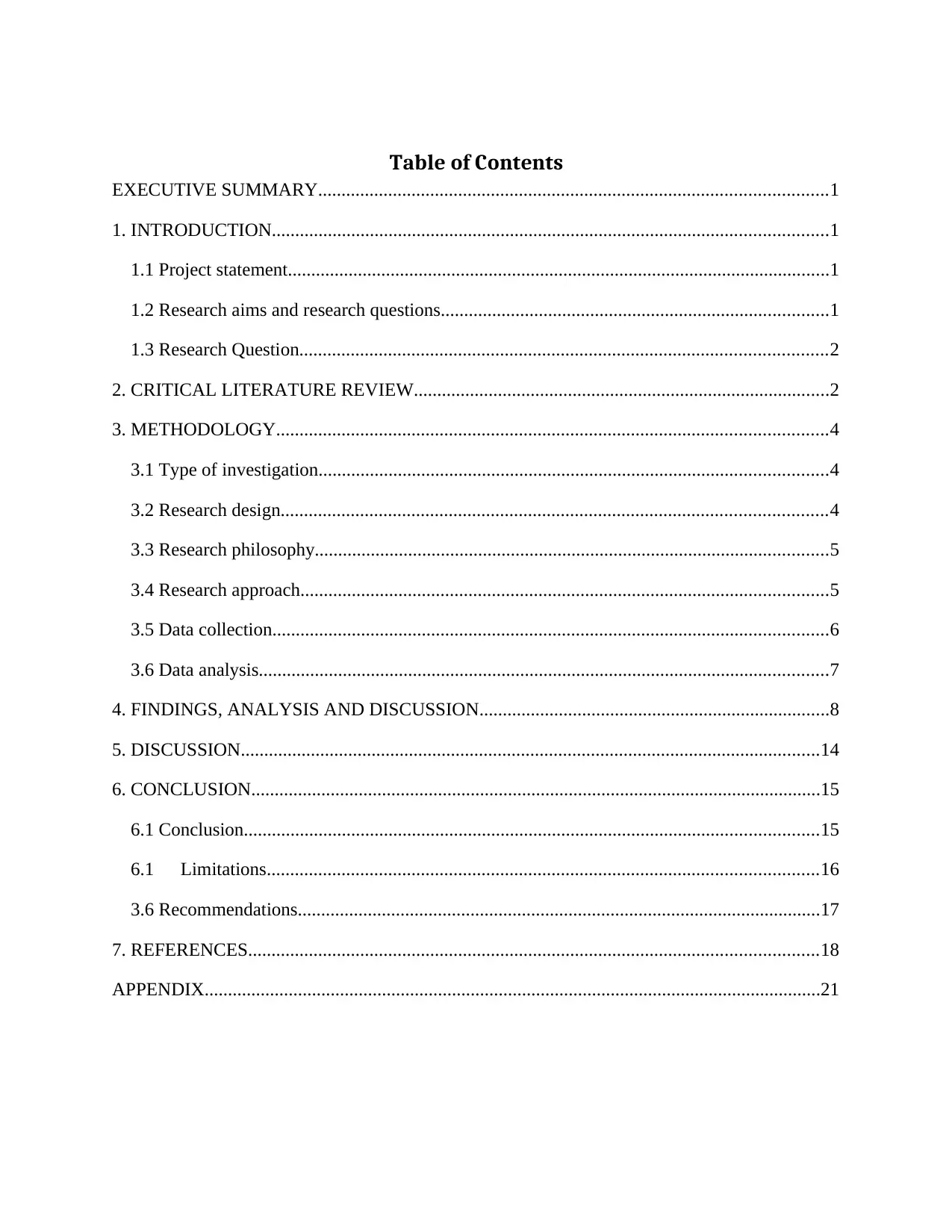
Table of Contents
EXECUTIVE SUMMARY.............................................................................................................1
1. INTRODUCTION.......................................................................................................................1
1.1 Project statement....................................................................................................................1
1.2 Research aims and research questions...................................................................................1
1.3 Research Question.................................................................................................................2
2. CRITICAL LITERATURE REVIEW.........................................................................................2
3. METHODOLOGY......................................................................................................................4
3.1 Type of investigation.............................................................................................................4
3.2 Research design.....................................................................................................................4
3.3 Research philosophy..............................................................................................................5
3.4 Research approach.................................................................................................................5
3.5 Data collection.......................................................................................................................6
3.6 Data analysis..........................................................................................................................7
4. FINDINGS, ANALYSIS AND DISCUSSION...........................................................................8
5. DISCUSSION............................................................................................................................14
6. CONCLUSION..........................................................................................................................15
6.1 Conclusion...........................................................................................................................15
6.1 Limitations......................................................................................................................16
3.6 Recommendations................................................................................................................17
7. REFERENCES..........................................................................................................................18
APPENDIX....................................................................................................................................21
EXECUTIVE SUMMARY.............................................................................................................1
1. INTRODUCTION.......................................................................................................................1
1.1 Project statement....................................................................................................................1
1.2 Research aims and research questions...................................................................................1
1.3 Research Question.................................................................................................................2
2. CRITICAL LITERATURE REVIEW.........................................................................................2
3. METHODOLOGY......................................................................................................................4
3.1 Type of investigation.............................................................................................................4
3.2 Research design.....................................................................................................................4
3.3 Research philosophy..............................................................................................................5
3.4 Research approach.................................................................................................................5
3.5 Data collection.......................................................................................................................6
3.6 Data analysis..........................................................................................................................7
4. FINDINGS, ANALYSIS AND DISCUSSION...........................................................................8
5. DISCUSSION............................................................................................................................14
6. CONCLUSION..........................................................................................................................15
6.1 Conclusion...........................................................................................................................15
6.1 Limitations......................................................................................................................16
3.6 Recommendations................................................................................................................17
7. REFERENCES..........................................................................................................................18
APPENDIX....................................................................................................................................21
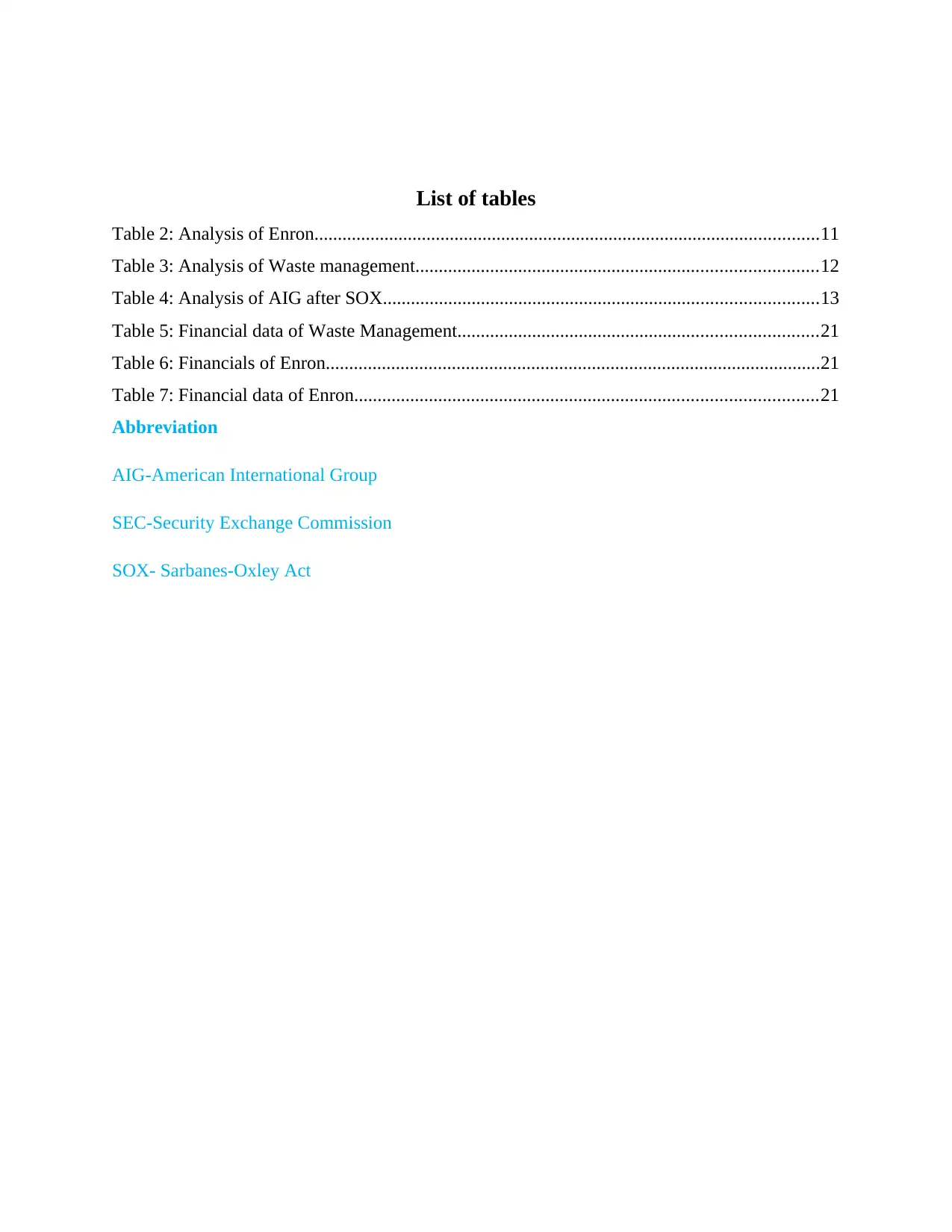
List of tables
Table 2: Analysis of Enron............................................................................................................11
Table 3: Analysis of Waste management......................................................................................12
Table 4: Analysis of AIG after SOX.............................................................................................13
Table 5: Financial data of Waste Management.............................................................................21
Table 6: Financials of Enron..........................................................................................................21
Table 7: Financial data of Enron...................................................................................................21
Abbreviation
AIG-American International Group
SEC-Security Exchange Commission
SOX- Sarbanes-Oxley Act
Table 2: Analysis of Enron............................................................................................................11
Table 3: Analysis of Waste management......................................................................................12
Table 4: Analysis of AIG after SOX.............................................................................................13
Table 5: Financial data of Waste Management.............................................................................21
Table 6: Financials of Enron..........................................................................................................21
Table 7: Financial data of Enron...................................................................................................21
Abbreviation
AIG-American International Group
SEC-Security Exchange Commission
SOX- Sarbanes-Oxley Act
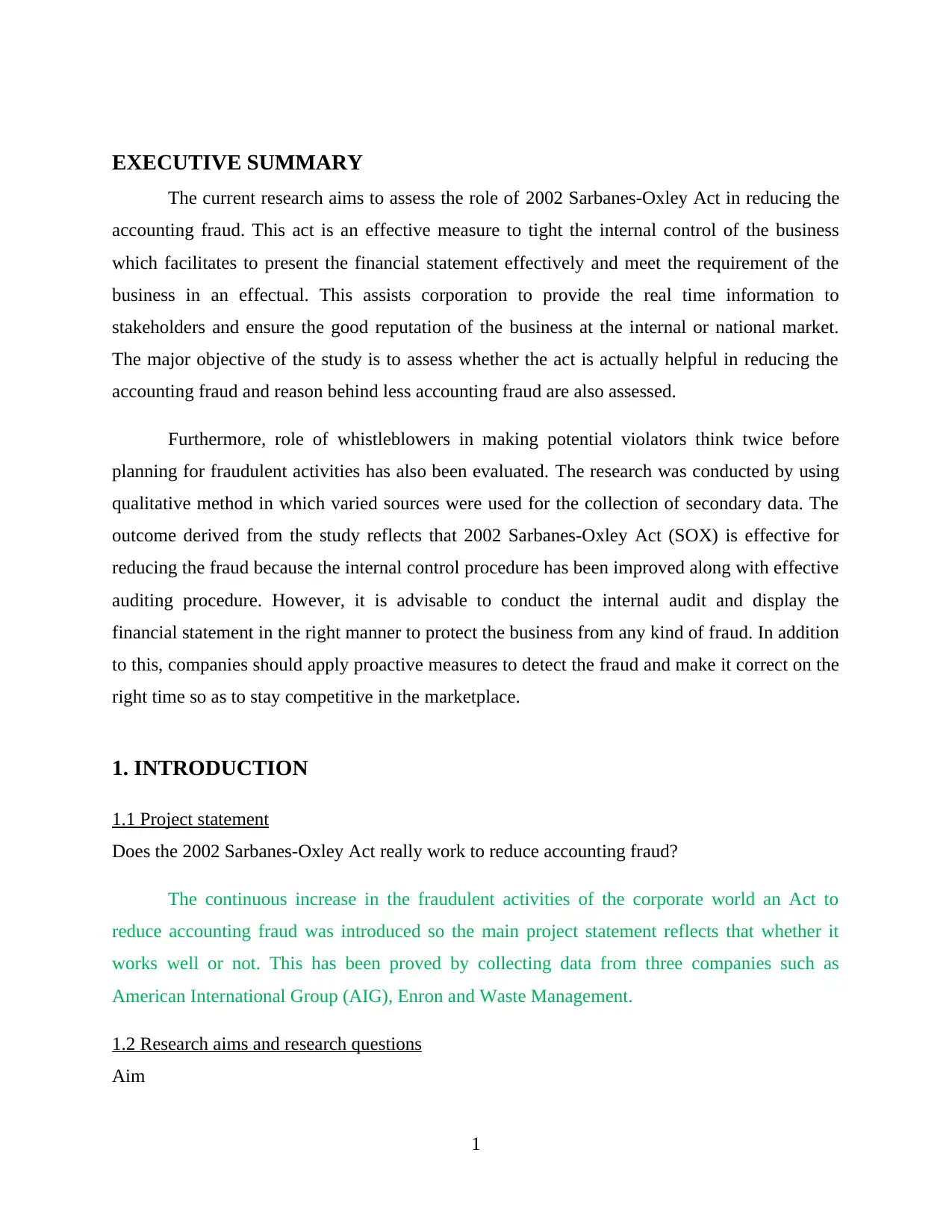
EXECUTIVE SUMMARY
The current research aims to assess the role of 2002 Sarbanes-Oxley Act in reducing the
accounting fraud. This act is an effective measure to tight the internal control of the business
which facilitates to present the financial statement effectively and meet the requirement of the
business in an effectual. This assists corporation to provide the real time information to
stakeholders and ensure the good reputation of the business at the internal or national market.
The major objective of the study is to assess whether the act is actually helpful in reducing the
accounting fraud and reason behind less accounting fraud are also assessed.
Furthermore, role of whistleblowers in making potential violators think twice before
planning for fraudulent activities has also been evaluated. The research was conducted by using
qualitative method in which varied sources were used for the collection of secondary data. The
outcome derived from the study reflects that 2002 Sarbanes-Oxley Act (SOX) is effective for
reducing the fraud because the internal control procedure has been improved along with effective
auditing procedure. However, it is advisable to conduct the internal audit and display the
financial statement in the right manner to protect the business from any kind of fraud. In addition
to this, companies should apply proactive measures to detect the fraud and make it correct on the
right time so as to stay competitive in the marketplace.
1. INTRODUCTION
1.1 Project statement
Does the 2002 Sarbanes-Oxley Act really work to reduce accounting fraud?
The continuous increase in the fraudulent activities of the corporate world an Act to
reduce accounting fraud was introduced so the main project statement reflects that whether it
works well or not. This has been proved by collecting data from three companies such as
American International Group (AIG), Enron and Waste Management.
1.2 Research aims and research questions
Aim
1
The current research aims to assess the role of 2002 Sarbanes-Oxley Act in reducing the
accounting fraud. This act is an effective measure to tight the internal control of the business
which facilitates to present the financial statement effectively and meet the requirement of the
business in an effectual. This assists corporation to provide the real time information to
stakeholders and ensure the good reputation of the business at the internal or national market.
The major objective of the study is to assess whether the act is actually helpful in reducing the
accounting fraud and reason behind less accounting fraud are also assessed.
Furthermore, role of whistleblowers in making potential violators think twice before
planning for fraudulent activities has also been evaluated. The research was conducted by using
qualitative method in which varied sources were used for the collection of secondary data. The
outcome derived from the study reflects that 2002 Sarbanes-Oxley Act (SOX) is effective for
reducing the fraud because the internal control procedure has been improved along with effective
auditing procedure. However, it is advisable to conduct the internal audit and display the
financial statement in the right manner to protect the business from any kind of fraud. In addition
to this, companies should apply proactive measures to detect the fraud and make it correct on the
right time so as to stay competitive in the marketplace.
1. INTRODUCTION
1.1 Project statement
Does the 2002 Sarbanes-Oxley Act really work to reduce accounting fraud?
The continuous increase in the fraudulent activities of the corporate world an Act to
reduce accounting fraud was introduced so the main project statement reflects that whether it
works well or not. This has been proved by collecting data from three companies such as
American International Group (AIG), Enron and Waste Management.
1.2 Research aims and research questions
Aim
1
Secure Best Marks with AI Grader
Need help grading? Try our AI Grader for instant feedback on your assignments.
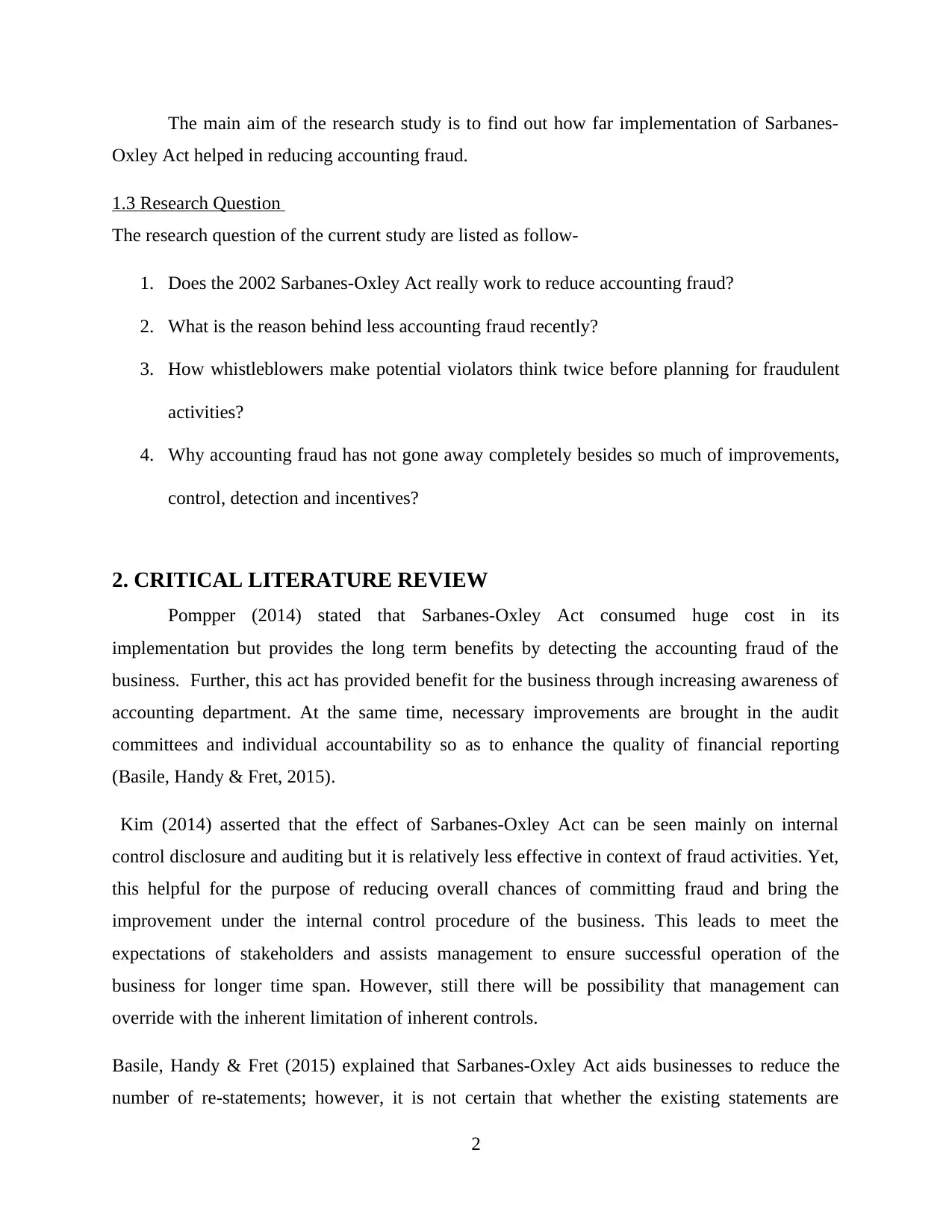
The main aim of the research study is to find out how far implementation of Sarbanes-
Oxley Act helped in reducing accounting fraud.
1.3 Research Question
The research question of the current study are listed as follow-
1. Does the 2002 Sarbanes-Oxley Act really work to reduce accounting fraud?
2. What is the reason behind less accounting fraud recently?
3. How whistleblowers make potential violators think twice before planning for fraudulent
activities?
4. Why accounting fraud has not gone away completely besides so much of improvements,
control, detection and incentives?
2. CRITICAL LITERATURE REVIEW
Pompper (2014) stated that Sarbanes-Oxley Act consumed huge cost in its
implementation but provides the long term benefits by detecting the accounting fraud of the
business. Further, this act has provided benefit for the business through increasing awareness of
accounting department. At the same time, necessary improvements are brought in the audit
committees and individual accountability so as to enhance the quality of financial reporting
(Basile, Handy & Fret, 2015).
Kim (2014) asserted that the effect of Sarbanes-Oxley Act can be seen mainly on internal
control disclosure and auditing but it is relatively less effective in context of fraud activities. Yet,
this helpful for the purpose of reducing overall chances of committing fraud and bring the
improvement under the internal control procedure of the business. This leads to meet the
expectations of stakeholders and assists management to ensure successful operation of the
business for longer time span. However, still there will be possibility that management can
override with the inherent limitation of inherent controls.
Basile, Handy & Fret (2015) explained that Sarbanes-Oxley Act aids businesses to reduce the
number of re-statements; however, it is not certain that whether the existing statements are
2
Oxley Act helped in reducing accounting fraud.
1.3 Research Question
The research question of the current study are listed as follow-
1. Does the 2002 Sarbanes-Oxley Act really work to reduce accounting fraud?
2. What is the reason behind less accounting fraud recently?
3. How whistleblowers make potential violators think twice before planning for fraudulent
activities?
4. Why accounting fraud has not gone away completely besides so much of improvements,
control, detection and incentives?
2. CRITICAL LITERATURE REVIEW
Pompper (2014) stated that Sarbanes-Oxley Act consumed huge cost in its
implementation but provides the long term benefits by detecting the accounting fraud of the
business. Further, this act has provided benefit for the business through increasing awareness of
accounting department. At the same time, necessary improvements are brought in the audit
committees and individual accountability so as to enhance the quality of financial reporting
(Basile, Handy & Fret, 2015).
Kim (2014) asserted that the effect of Sarbanes-Oxley Act can be seen mainly on internal
control disclosure and auditing but it is relatively less effective in context of fraud activities. Yet,
this helpful for the purpose of reducing overall chances of committing fraud and bring the
improvement under the internal control procedure of the business. This leads to meet the
expectations of stakeholders and assists management to ensure successful operation of the
business for longer time span. However, still there will be possibility that management can
override with the inherent limitation of inherent controls.
Basile, Handy & Fret (2015) explained that Sarbanes-Oxley Act aids businesses to reduce the
number of re-statements; however, it is not certain that whether the existing statements are
2
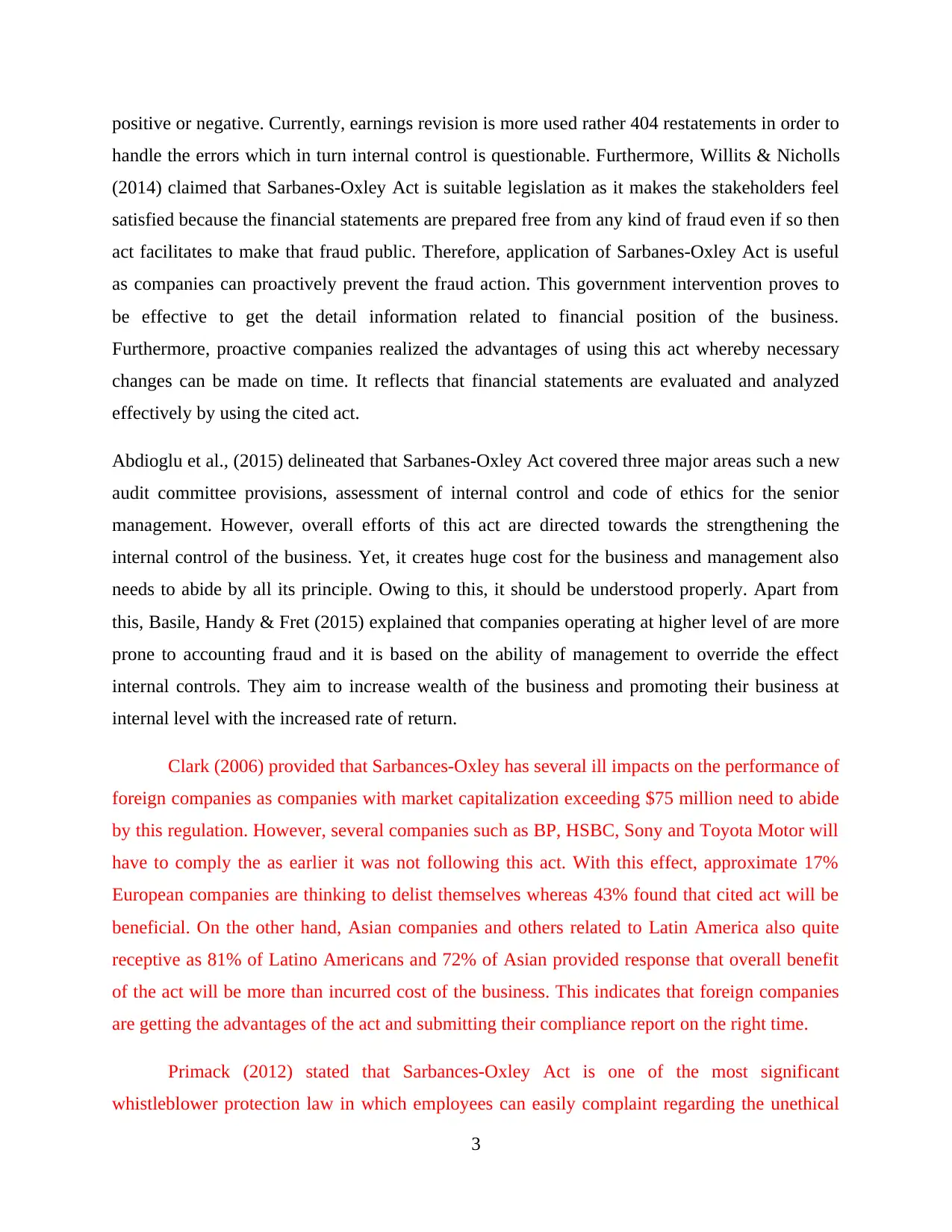
positive or negative. Currently, earnings revision is more used rather 404 restatements in order to
handle the errors which in turn internal control is questionable. Furthermore, Willits & Nicholls
(2014) claimed that Sarbanes-Oxley Act is suitable legislation as it makes the stakeholders feel
satisfied because the financial statements are prepared free from any kind of fraud even if so then
act facilitates to make that fraud public. Therefore, application of Sarbanes-Oxley Act is useful
as companies can proactively prevent the fraud action. This government intervention proves to
be effective to get the detail information related to financial position of the business.
Furthermore, proactive companies realized the advantages of using this act whereby necessary
changes can be made on time. It reflects that financial statements are evaluated and analyzed
effectively by using the cited act.
Abdioglu et al., (2015) delineated that Sarbanes-Oxley Act covered three major areas such a new
audit committee provisions, assessment of internal control and code of ethics for the senior
management. However, overall efforts of this act are directed towards the strengthening the
internal control of the business. Yet, it creates huge cost for the business and management also
needs to abide by all its principle. Owing to this, it should be understood properly. Apart from
this, Basile, Handy & Fret (2015) explained that companies operating at higher level of are more
prone to accounting fraud and it is based on the ability of management to override the effect
internal controls. They aim to increase wealth of the business and promoting their business at
internal level with the increased rate of return.
Clark (2006) provided that Sarbances-Oxley has several ill impacts on the performance of
foreign companies as companies with market capitalization exceeding $75 million need to abide
by this regulation. However, several companies such as BP, HSBC, Sony and Toyota Motor will
have to comply the as earlier it was not following this act. With this effect, approximate 17%
European companies are thinking to delist themselves whereas 43% found that cited act will be
beneficial. On the other hand, Asian companies and others related to Latin America also quite
receptive as 81% of Latino Americans and 72% of Asian provided response that overall benefit
of the act will be more than incurred cost of the business. This indicates that foreign companies
are getting the advantages of the act and submitting their compliance report on the right time.
Primack (2012) stated that Sarbances-Oxley Act is one of the most significant
whistleblower protection law in which employees can easily complaint regarding the unethical
3
handle the errors which in turn internal control is questionable. Furthermore, Willits & Nicholls
(2014) claimed that Sarbanes-Oxley Act is suitable legislation as it makes the stakeholders feel
satisfied because the financial statements are prepared free from any kind of fraud even if so then
act facilitates to make that fraud public. Therefore, application of Sarbanes-Oxley Act is useful
as companies can proactively prevent the fraud action. This government intervention proves to
be effective to get the detail information related to financial position of the business.
Furthermore, proactive companies realized the advantages of using this act whereby necessary
changes can be made on time. It reflects that financial statements are evaluated and analyzed
effectively by using the cited act.
Abdioglu et al., (2015) delineated that Sarbanes-Oxley Act covered three major areas such a new
audit committee provisions, assessment of internal control and code of ethics for the senior
management. However, overall efforts of this act are directed towards the strengthening the
internal control of the business. Yet, it creates huge cost for the business and management also
needs to abide by all its principle. Owing to this, it should be understood properly. Apart from
this, Basile, Handy & Fret (2015) explained that companies operating at higher level of are more
prone to accounting fraud and it is based on the ability of management to override the effect
internal controls. They aim to increase wealth of the business and promoting their business at
internal level with the increased rate of return.
Clark (2006) provided that Sarbances-Oxley has several ill impacts on the performance of
foreign companies as companies with market capitalization exceeding $75 million need to abide
by this regulation. However, several companies such as BP, HSBC, Sony and Toyota Motor will
have to comply the as earlier it was not following this act. With this effect, approximate 17%
European companies are thinking to delist themselves whereas 43% found that cited act will be
beneficial. On the other hand, Asian companies and others related to Latin America also quite
receptive as 81% of Latino Americans and 72% of Asian provided response that overall benefit
of the act will be more than incurred cost of the business. This indicates that foreign companies
are getting the advantages of the act and submitting their compliance report on the right time.
Primack (2012) stated that Sarbances-Oxley Act is one of the most significant
whistleblower protection law in which employees can easily complaint regarding the unethical
3
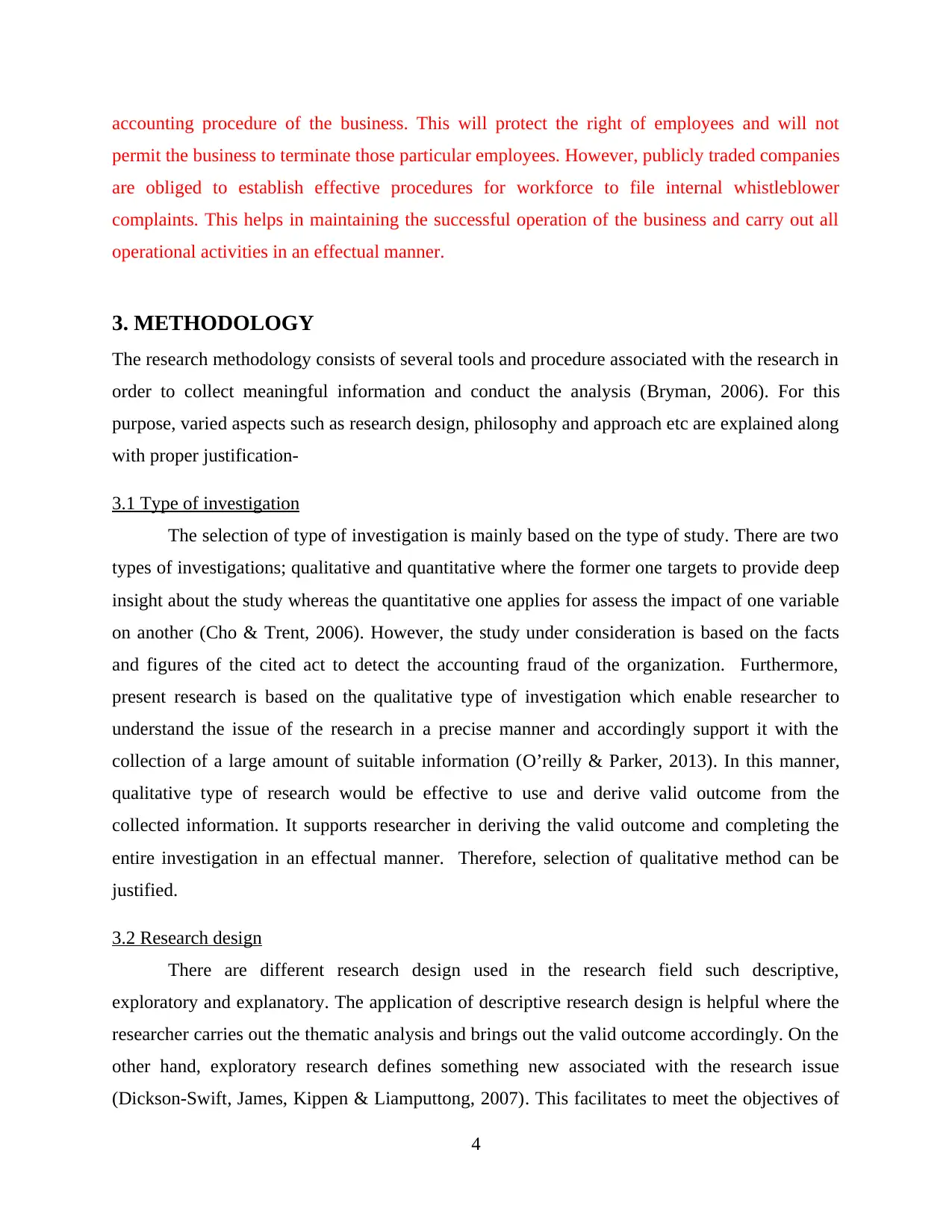
accounting procedure of the business. This will protect the right of employees and will not
permit the business to terminate those particular employees. However, publicly traded companies
are obliged to establish effective procedures for workforce to file internal whistleblower
complaints. This helps in maintaining the successful operation of the business and carry out all
operational activities in an effectual manner.
3. METHODOLOGY
The research methodology consists of several tools and procedure associated with the research in
order to collect meaningful information and conduct the analysis (Bryman, 2006). For this
purpose, varied aspects such as research design, philosophy and approach etc are explained along
with proper justification-
3.1 Type of investigation
The selection of type of investigation is mainly based on the type of study. There are two
types of investigations; qualitative and quantitative where the former one targets to provide deep
insight about the study whereas the quantitative one applies for assess the impact of one variable
on another (Cho & Trent, 2006). However, the study under consideration is based on the facts
and figures of the cited act to detect the accounting fraud of the organization. Furthermore,
present research is based on the qualitative type of investigation which enable researcher to
understand the issue of the research in a precise manner and accordingly support it with the
collection of a large amount of suitable information (O’reilly & Parker, 2013). In this manner,
qualitative type of research would be effective to use and derive valid outcome from the
collected information. It supports researcher in deriving the valid outcome and completing the
entire investigation in an effectual manner. Therefore, selection of qualitative method can be
justified.
3.2 Research design
There are different research design used in the research field such descriptive,
exploratory and explanatory. The application of descriptive research design is helpful where the
researcher carries out the thematic analysis and brings out the valid outcome accordingly. On the
other hand, exploratory research defines something new associated with the research issue
(Dickson-Swift, James, Kippen & Liamputtong, 2007). This facilitates to meet the objectives of
4
permit the business to terminate those particular employees. However, publicly traded companies
are obliged to establish effective procedures for workforce to file internal whistleblower
complaints. This helps in maintaining the successful operation of the business and carry out all
operational activities in an effectual manner.
3. METHODOLOGY
The research methodology consists of several tools and procedure associated with the research in
order to collect meaningful information and conduct the analysis (Bryman, 2006). For this
purpose, varied aspects such as research design, philosophy and approach etc are explained along
with proper justification-
3.1 Type of investigation
The selection of type of investigation is mainly based on the type of study. There are two
types of investigations; qualitative and quantitative where the former one targets to provide deep
insight about the study whereas the quantitative one applies for assess the impact of one variable
on another (Cho & Trent, 2006). However, the study under consideration is based on the facts
and figures of the cited act to detect the accounting fraud of the organization. Furthermore,
present research is based on the qualitative type of investigation which enable researcher to
understand the issue of the research in a precise manner and accordingly support it with the
collection of a large amount of suitable information (O’reilly & Parker, 2013). In this manner,
qualitative type of research would be effective to use and derive valid outcome from the
collected information. It supports researcher in deriving the valid outcome and completing the
entire investigation in an effectual manner. Therefore, selection of qualitative method can be
justified.
3.2 Research design
There are different research design used in the research field such descriptive,
exploratory and explanatory. The application of descriptive research design is helpful where the
researcher carries out the thematic analysis and brings out the valid outcome accordingly. On the
other hand, exploratory research defines something new associated with the research issue
(Dickson-Swift, James, Kippen & Liamputtong, 2007). This facilitates to meet the objectives of
4
Paraphrase This Document
Need a fresh take? Get an instant paraphrase of this document with our AI Paraphraser
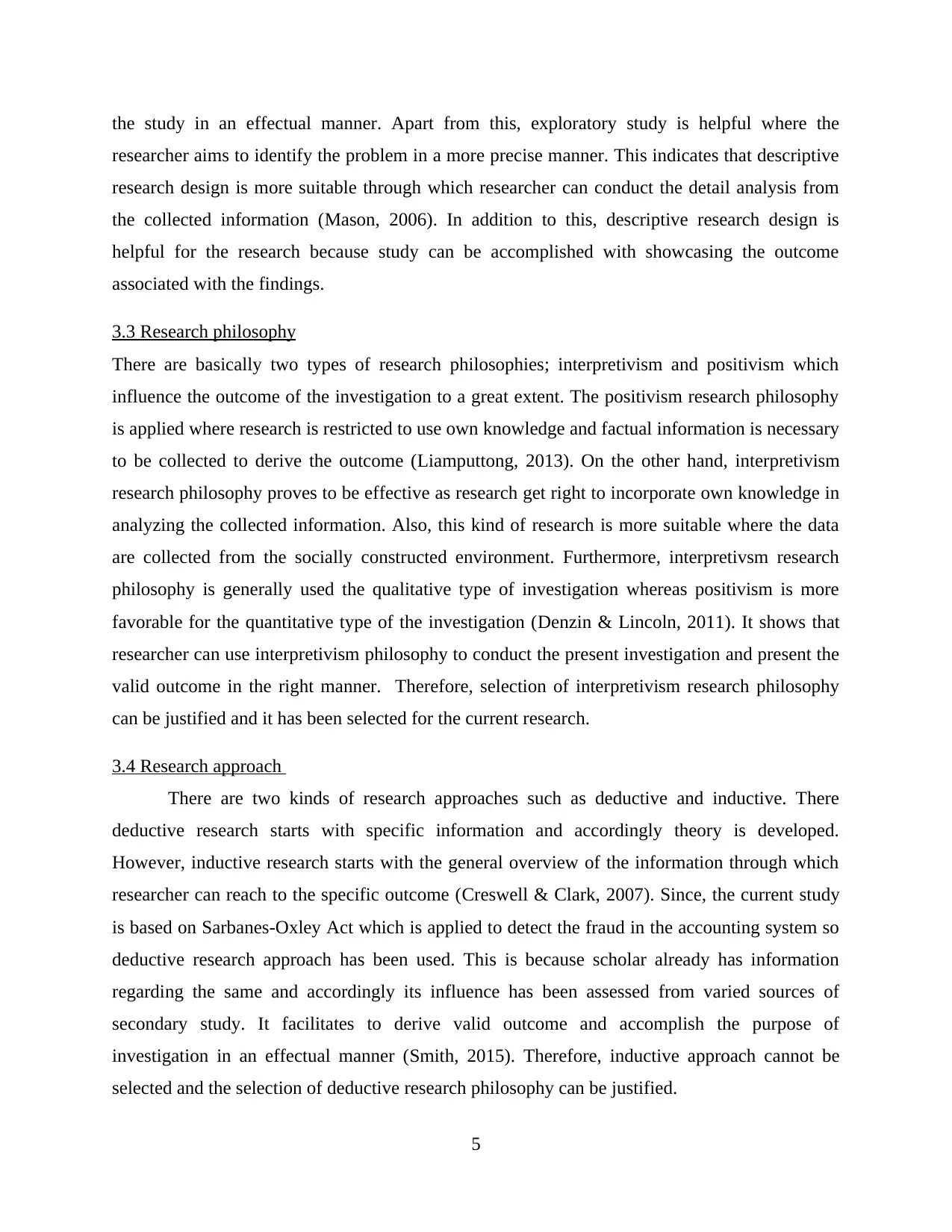
the study in an effectual manner. Apart from this, exploratory study is helpful where the
researcher aims to identify the problem in a more precise manner. This indicates that descriptive
research design is more suitable through which researcher can conduct the detail analysis from
the collected information (Mason, 2006). In addition to this, descriptive research design is
helpful for the research because study can be accomplished with showcasing the outcome
associated with the findings.
3.3 Research philosophy
There are basically two types of research philosophies; interpretivism and positivism which
influence the outcome of the investigation to a great extent. The positivism research philosophy
is applied where research is restricted to use own knowledge and factual information is necessary
to be collected to derive the outcome (Liamputtong, 2013). On the other hand, interpretivism
research philosophy proves to be effective as research get right to incorporate own knowledge in
analyzing the collected information. Also, this kind of research is more suitable where the data
are collected from the socially constructed environment. Furthermore, interpretivsm research
philosophy is generally used the qualitative type of investigation whereas positivism is more
favorable for the quantitative type of the investigation (Denzin & Lincoln, 2011). It shows that
researcher can use interpretivism philosophy to conduct the present investigation and present the
valid outcome in the right manner. Therefore, selection of interpretivism research philosophy
can be justified and it has been selected for the current research.
3.4 Research approach
There are two kinds of research approaches such as deductive and inductive. There
deductive research starts with specific information and accordingly theory is developed.
However, inductive research starts with the general overview of the information through which
researcher can reach to the specific outcome (Creswell & Clark, 2007). Since, the current study
is based on Sarbanes-Oxley Act which is applied to detect the fraud in the accounting system so
deductive research approach has been used. This is because scholar already has information
regarding the same and accordingly its influence has been assessed from varied sources of
secondary study. It facilitates to derive valid outcome and accomplish the purpose of
investigation in an effectual manner (Smith, 2015). Therefore, inductive approach cannot be
selected and the selection of deductive research philosophy can be justified.
5
researcher aims to identify the problem in a more precise manner. This indicates that descriptive
research design is more suitable through which researcher can conduct the detail analysis from
the collected information (Mason, 2006). In addition to this, descriptive research design is
helpful for the research because study can be accomplished with showcasing the outcome
associated with the findings.
3.3 Research philosophy
There are basically two types of research philosophies; interpretivism and positivism which
influence the outcome of the investigation to a great extent. The positivism research philosophy
is applied where research is restricted to use own knowledge and factual information is necessary
to be collected to derive the outcome (Liamputtong, 2013). On the other hand, interpretivism
research philosophy proves to be effective as research get right to incorporate own knowledge in
analyzing the collected information. Also, this kind of research is more suitable where the data
are collected from the socially constructed environment. Furthermore, interpretivsm research
philosophy is generally used the qualitative type of investigation whereas positivism is more
favorable for the quantitative type of the investigation (Denzin & Lincoln, 2011). It shows that
researcher can use interpretivism philosophy to conduct the present investigation and present the
valid outcome in the right manner. Therefore, selection of interpretivism research philosophy
can be justified and it has been selected for the current research.
3.4 Research approach
There are two kinds of research approaches such as deductive and inductive. There
deductive research starts with specific information and accordingly theory is developed.
However, inductive research starts with the general overview of the information through which
researcher can reach to the specific outcome (Creswell & Clark, 2007). Since, the current study
is based on Sarbanes-Oxley Act which is applied to detect the fraud in the accounting system so
deductive research approach has been used. This is because scholar already has information
regarding the same and accordingly its influence has been assessed from varied sources of
secondary study. It facilitates to derive valid outcome and accomplish the purpose of
investigation in an effectual manner (Smith, 2015). Therefore, inductive approach cannot be
selected and the selection of deductive research philosophy can be justified.
5
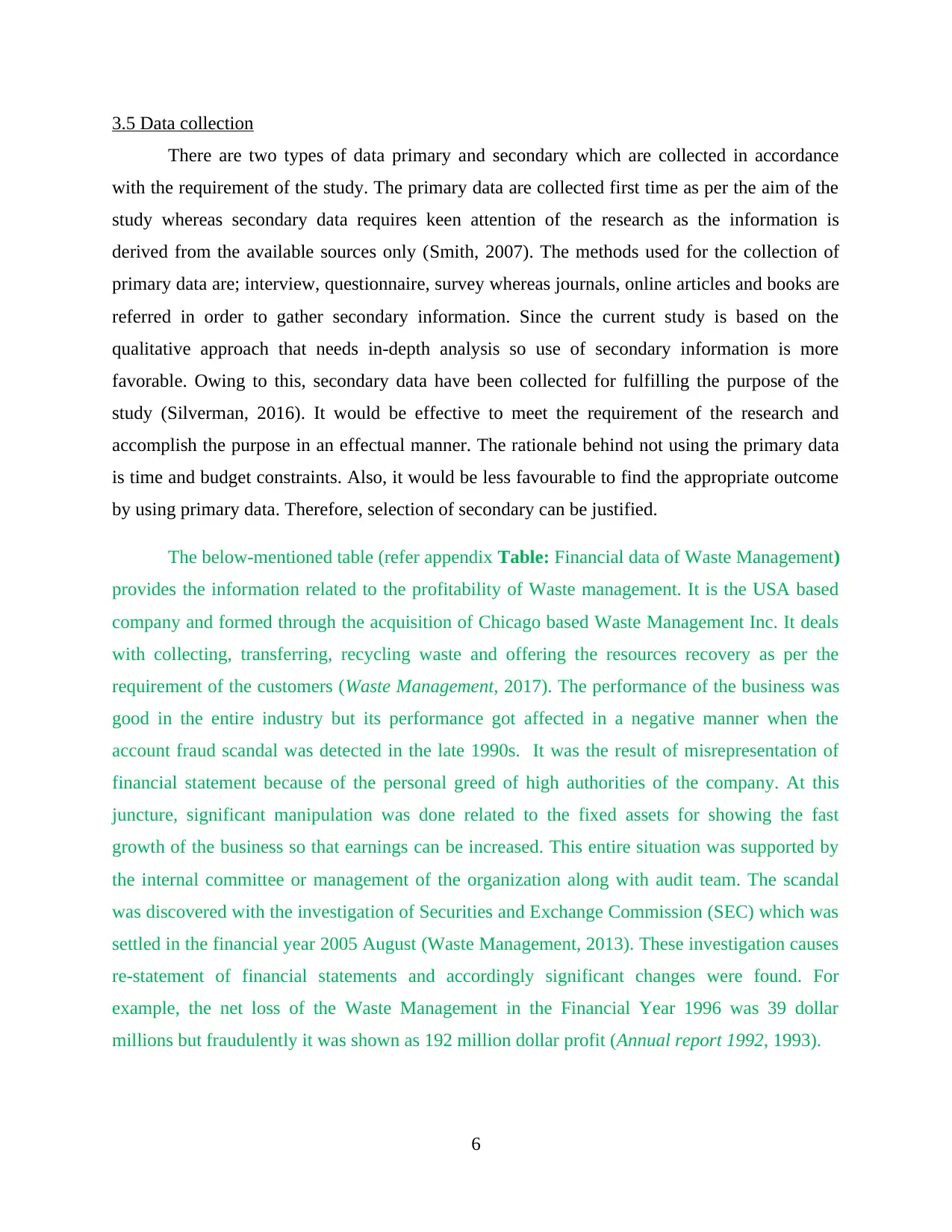
3.5 Data collection
There are two types of data primary and secondary which are collected in accordance
with the requirement of the study. The primary data are collected first time as per the aim of the
study whereas secondary data requires keen attention of the research as the information is
derived from the available sources only (Smith, 2007). The methods used for the collection of
primary data are; interview, questionnaire, survey whereas journals, online articles and books are
referred in order to gather secondary information. Since the current study is based on the
qualitative approach that needs in-depth analysis so use of secondary information is more
favorable. Owing to this, secondary data have been collected for fulfilling the purpose of the
study (Silverman, 2016). It would be effective to meet the requirement of the research and
accomplish the purpose in an effectual manner. The rationale behind not using the primary data
is time and budget constraints. Also, it would be less favourable to find the appropriate outcome
by using primary data. Therefore, selection of secondary can be justified.
The below-mentioned table (refer appendix Table: Financial data of Waste Management)
provides the information related to the profitability of Waste management. It is the USA based
company and formed through the acquisition of Chicago based Waste Management Inc. It deals
with collecting, transferring, recycling waste and offering the resources recovery as per the
requirement of the customers (Waste Management, 2017). The performance of the business was
good in the entire industry but its performance got affected in a negative manner when the
account fraud scandal was detected in the late 1990s. It was the result of misrepresentation of
financial statement because of the personal greed of high authorities of the company. At this
juncture, significant manipulation was done related to the fixed assets for showing the fast
growth of the business so that earnings can be increased. This entire situation was supported by
the internal committee or management of the organization along with audit team. The scandal
was discovered with the investigation of Securities and Exchange Commission (SEC) which was
settled in the financial year 2005 August (Waste Management, 2013). These investigation causes
re-statement of financial statements and accordingly significant changes were found. For
example, the net loss of the Waste Management in the Financial Year 1996 was 39 dollar
millions but fraudulently it was shown as 192 million dollar profit (Annual report 1992, 1993).
6
There are two types of data primary and secondary which are collected in accordance
with the requirement of the study. The primary data are collected first time as per the aim of the
study whereas secondary data requires keen attention of the research as the information is
derived from the available sources only (Smith, 2007). The methods used for the collection of
primary data are; interview, questionnaire, survey whereas journals, online articles and books are
referred in order to gather secondary information. Since the current study is based on the
qualitative approach that needs in-depth analysis so use of secondary information is more
favorable. Owing to this, secondary data have been collected for fulfilling the purpose of the
study (Silverman, 2016). It would be effective to meet the requirement of the research and
accomplish the purpose in an effectual manner. The rationale behind not using the primary data
is time and budget constraints. Also, it would be less favourable to find the appropriate outcome
by using primary data. Therefore, selection of secondary can be justified.
The below-mentioned table (refer appendix Table: Financial data of Waste Management)
provides the information related to the profitability of Waste management. It is the USA based
company and formed through the acquisition of Chicago based Waste Management Inc. It deals
with collecting, transferring, recycling waste and offering the resources recovery as per the
requirement of the customers (Waste Management, 2017). The performance of the business was
good in the entire industry but its performance got affected in a negative manner when the
account fraud scandal was detected in the late 1990s. It was the result of misrepresentation of
financial statement because of the personal greed of high authorities of the company. At this
juncture, significant manipulation was done related to the fixed assets for showing the fast
growth of the business so that earnings can be increased. This entire situation was supported by
the internal committee or management of the organization along with audit team. The scandal
was discovered with the investigation of Securities and Exchange Commission (SEC) which was
settled in the financial year 2005 August (Waste Management, 2013). These investigation causes
re-statement of financial statements and accordingly significant changes were found. For
example, the net loss of the Waste Management in the Financial Year 1996 was 39 dollar
millions but fraudulently it was shown as 192 million dollar profit (Annual report 1992, 1993).
6
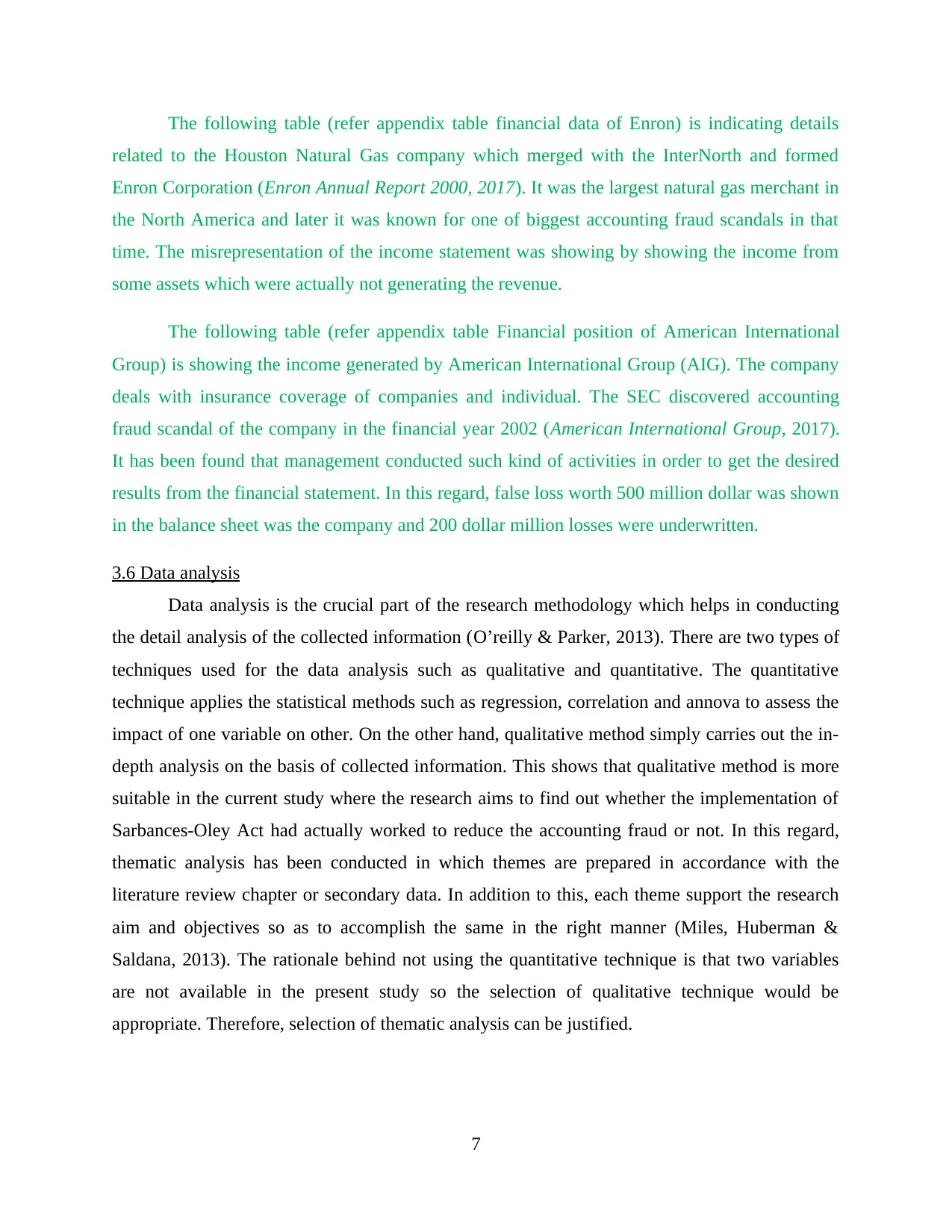
The following table (refer appendix table financial data of Enron) is indicating details
related to the Houston Natural Gas company which merged with the InterNorth and formed
Enron Corporation (Enron Annual Report 2000, 2017). It was the largest natural gas merchant in
the North America and later it was known for one of biggest accounting fraud scandals in that
time. The misrepresentation of the income statement was showing by showing the income from
some assets which were actually not generating the revenue.
The following table (refer appendix table Financial position of American International
Group) is showing the income generated by American International Group (AIG). The company
deals with insurance coverage of companies and individual. The SEC discovered accounting
fraud scandal of the company in the financial year 2002 (American International Group, 2017).
It has been found that management conducted such kind of activities in order to get the desired
results from the financial statement. In this regard, false loss worth 500 million dollar was shown
in the balance sheet was the company and 200 dollar million losses were underwritten.
3.6 Data analysis
Data analysis is the crucial part of the research methodology which helps in conducting
the detail analysis of the collected information (O’reilly & Parker, 2013). There are two types of
techniques used for the data analysis such as qualitative and quantitative. The quantitative
technique applies the statistical methods such as regression, correlation and annova to assess the
impact of one variable on other. On the other hand, qualitative method simply carries out the in-
depth analysis on the basis of collected information. This shows that qualitative method is more
suitable in the current study where the research aims to find out whether the implementation of
Sarbances-Oley Act had actually worked to reduce the accounting fraud or not. In this regard,
thematic analysis has been conducted in which themes are prepared in accordance with the
literature review chapter or secondary data. In addition to this, each theme support the research
aim and objectives so as to accomplish the same in the right manner (Miles, Huberman &
Saldana, 2013). The rationale behind not using the quantitative technique is that two variables
are not available in the present study so the selection of qualitative technique would be
appropriate. Therefore, selection of thematic analysis can be justified.
7
related to the Houston Natural Gas company which merged with the InterNorth and formed
Enron Corporation (Enron Annual Report 2000, 2017). It was the largest natural gas merchant in
the North America and later it was known for one of biggest accounting fraud scandals in that
time. The misrepresentation of the income statement was showing by showing the income from
some assets which were actually not generating the revenue.
The following table (refer appendix table Financial position of American International
Group) is showing the income generated by American International Group (AIG). The company
deals with insurance coverage of companies and individual. The SEC discovered accounting
fraud scandal of the company in the financial year 2002 (American International Group, 2017).
It has been found that management conducted such kind of activities in order to get the desired
results from the financial statement. In this regard, false loss worth 500 million dollar was shown
in the balance sheet was the company and 200 dollar million losses were underwritten.
3.6 Data analysis
Data analysis is the crucial part of the research methodology which helps in conducting
the detail analysis of the collected information (O’reilly & Parker, 2013). There are two types of
techniques used for the data analysis such as qualitative and quantitative. The quantitative
technique applies the statistical methods such as regression, correlation and annova to assess the
impact of one variable on other. On the other hand, qualitative method simply carries out the in-
depth analysis on the basis of collected information. This shows that qualitative method is more
suitable in the current study where the research aims to find out whether the implementation of
Sarbances-Oley Act had actually worked to reduce the accounting fraud or not. In this regard,
thematic analysis has been conducted in which themes are prepared in accordance with the
literature review chapter or secondary data. In addition to this, each theme support the research
aim and objectives so as to accomplish the same in the right manner (Miles, Huberman &
Saldana, 2013). The rationale behind not using the quantitative technique is that two variables
are not available in the present study so the selection of qualitative technique would be
appropriate. Therefore, selection of thematic analysis can be justified.
7
Secure Best Marks with AI Grader
Need help grading? Try our AI Grader for instant feedback on your assignments.
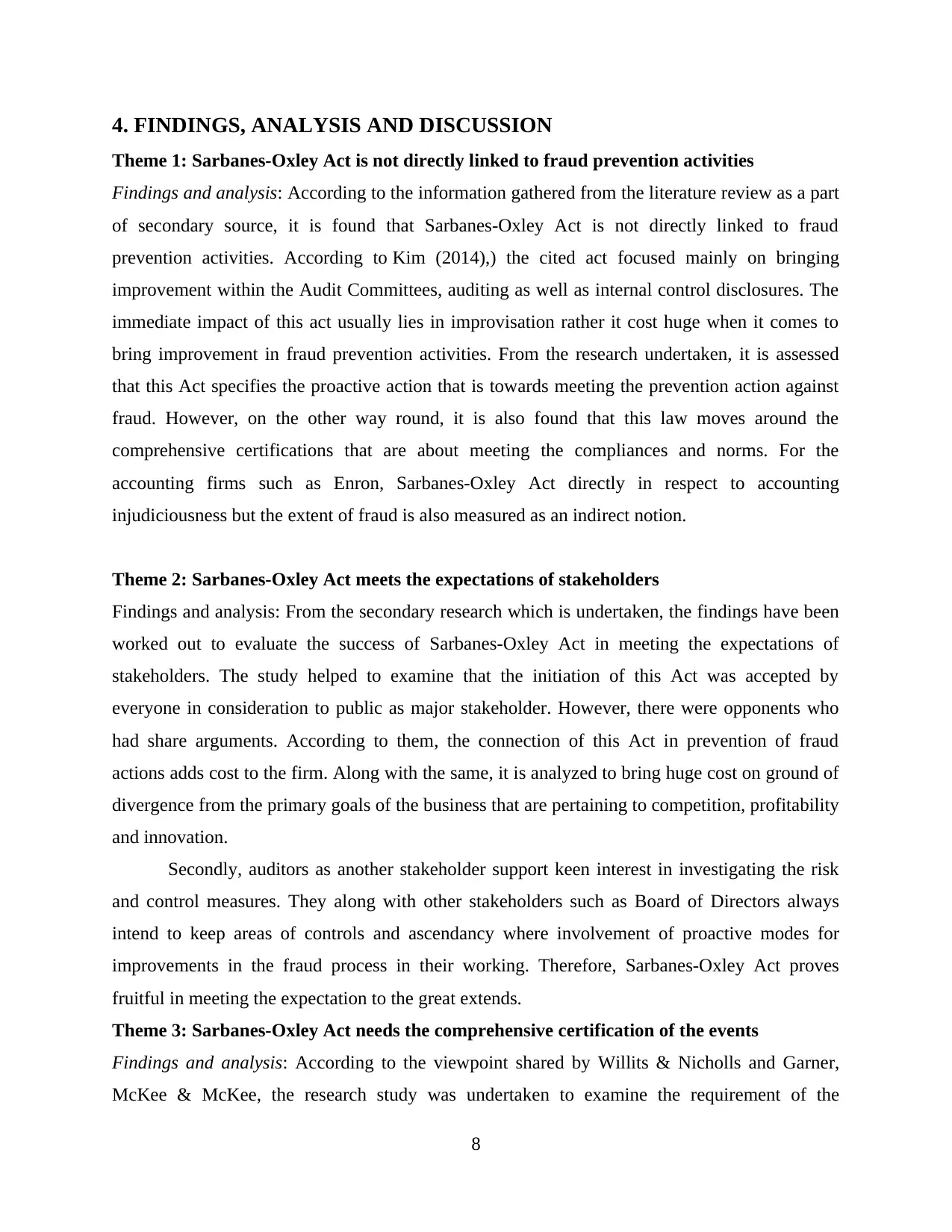
4. FINDINGS, ANALYSIS AND DISCUSSION
Theme 1: Sarbanes-Oxley Act is not directly linked to fraud prevention activities
Findings and analysis: According to the information gathered from the literature review as a part
of secondary source, it is found that Sarbanes-Oxley Act is not directly linked to fraud
prevention activities. According to Kim (2014),) the cited act focused mainly on bringing
improvement within the Audit Committees, auditing as well as internal control disclosures. The
immediate impact of this act usually lies in improvisation rather it cost huge when it comes to
bring improvement in fraud prevention activities. From the research undertaken, it is assessed
that this Act specifies the proactive action that is towards meeting the prevention action against
fraud. However, on the other way round, it is also found that this law moves around the
comprehensive certifications that are about meeting the compliances and norms. For the
accounting firms such as Enron, Sarbanes-Oxley Act directly in respect to accounting
injudiciousness but the extent of fraud is also measured as an indirect notion.
Theme 2: Sarbanes-Oxley Act meets the expectations of stakeholders
Findings and analysis: From the secondary research which is undertaken, the findings have been
worked out to evaluate the success of Sarbanes-Oxley Act in meeting the expectations of
stakeholders. The study helped to examine that the initiation of this Act was accepted by
everyone in consideration to public as major stakeholder. However, there were opponents who
had share arguments. According to them, the connection of this Act in prevention of fraud
actions adds cost to the firm. Along with the same, it is analyzed to bring huge cost on ground of
divergence from the primary goals of the business that are pertaining to competition, profitability
and innovation.
Secondly, auditors as another stakeholder support keen interest in investigating the risk
and control measures. They along with other stakeholders such as Board of Directors always
intend to keep areas of controls and ascendancy where involvement of proactive modes for
improvements in the fraud process in their working. Therefore, Sarbanes-Oxley Act proves
fruitful in meeting the expectation to the great extends.
Theme 3: Sarbanes-Oxley Act needs the comprehensive certification of the events
Findings and analysis: According to the viewpoint shared by Willits & Nicholls and Garner,
McKee & McKee, the research study was undertaken to examine the requirement of the
8
Theme 1: Sarbanes-Oxley Act is not directly linked to fraud prevention activities
Findings and analysis: According to the information gathered from the literature review as a part
of secondary source, it is found that Sarbanes-Oxley Act is not directly linked to fraud
prevention activities. According to Kim (2014),) the cited act focused mainly on bringing
improvement within the Audit Committees, auditing as well as internal control disclosures. The
immediate impact of this act usually lies in improvisation rather it cost huge when it comes to
bring improvement in fraud prevention activities. From the research undertaken, it is assessed
that this Act specifies the proactive action that is towards meeting the prevention action against
fraud. However, on the other way round, it is also found that this law moves around the
comprehensive certifications that are about meeting the compliances and norms. For the
accounting firms such as Enron, Sarbanes-Oxley Act directly in respect to accounting
injudiciousness but the extent of fraud is also measured as an indirect notion.
Theme 2: Sarbanes-Oxley Act meets the expectations of stakeholders
Findings and analysis: From the secondary research which is undertaken, the findings have been
worked out to evaluate the success of Sarbanes-Oxley Act in meeting the expectations of
stakeholders. The study helped to examine that the initiation of this Act was accepted by
everyone in consideration to public as major stakeholder. However, there were opponents who
had share arguments. According to them, the connection of this Act in prevention of fraud
actions adds cost to the firm. Along with the same, it is analyzed to bring huge cost on ground of
divergence from the primary goals of the business that are pertaining to competition, profitability
and innovation.
Secondly, auditors as another stakeholder support keen interest in investigating the risk
and control measures. They along with other stakeholders such as Board of Directors always
intend to keep areas of controls and ascendancy where involvement of proactive modes for
improvements in the fraud process in their working. Therefore, Sarbanes-Oxley Act proves
fruitful in meeting the expectation to the great extends.
Theme 3: Sarbanes-Oxley Act needs the comprehensive certification of the events
Findings and analysis: According to the viewpoint shared by Willits & Nicholls and Garner,
McKee & McKee, the research study was undertaken to examine the requirement of the
8
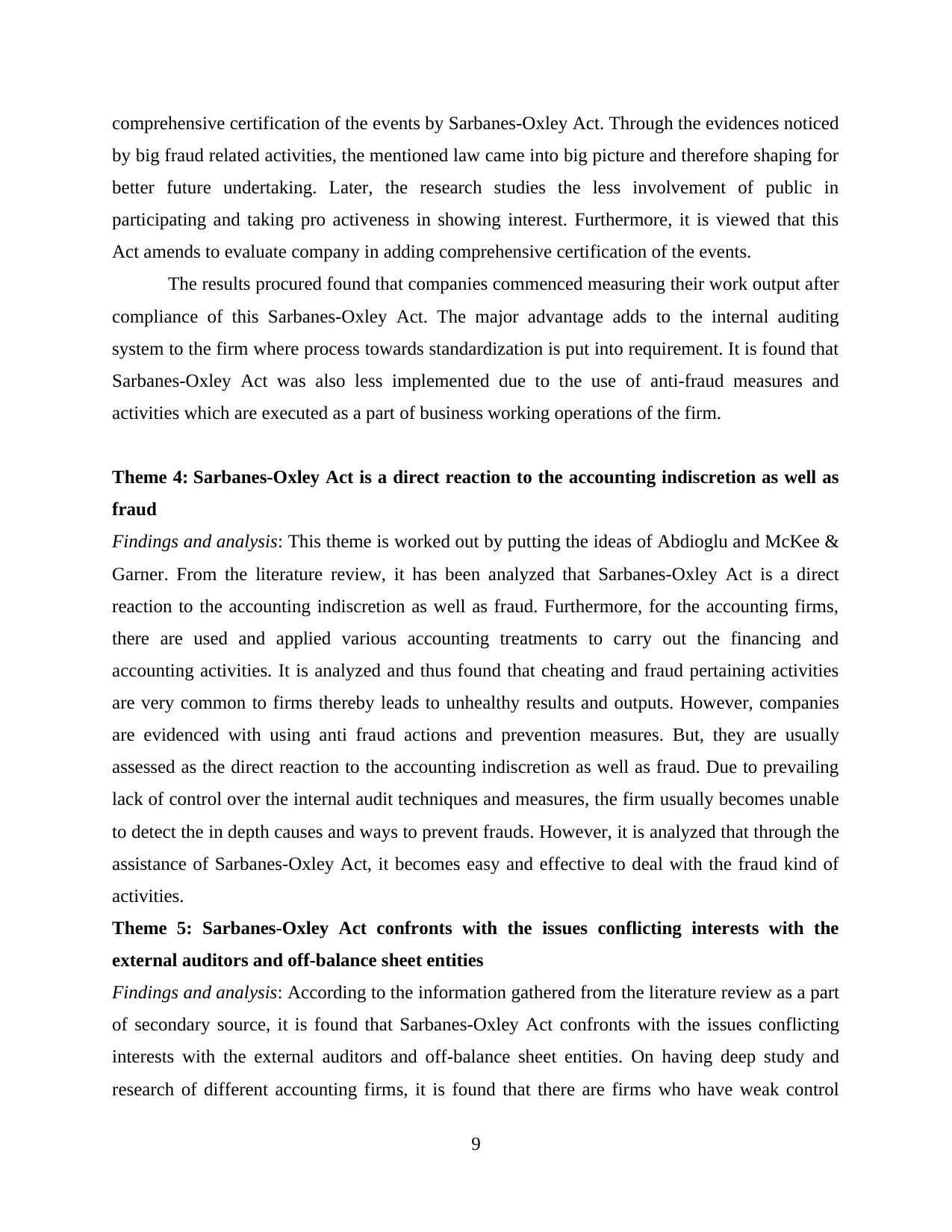
comprehensive certification of the events by Sarbanes-Oxley Act. Through the evidences noticed
by big fraud related activities, the mentioned law came into big picture and therefore shaping for
better future undertaking. Later, the research studies the less involvement of public in
participating and taking pro activeness in showing interest. Furthermore, it is viewed that this
Act amends to evaluate company in adding comprehensive certification of the events.
The results procured found that companies commenced measuring their work output after
compliance of this Sarbanes-Oxley Act. The major advantage adds to the internal auditing
system to the firm where process towards standardization is put into requirement. It is found that
Sarbanes-Oxley Act was also less implemented due to the use of anti-fraud measures and
activities which are executed as a part of business working operations of the firm.
Theme 4: Sarbanes-Oxley Act is a direct reaction to the accounting indiscretion as well as
fraud
Findings and analysis: This theme is worked out by putting the ideas of Abdioglu and McKee &
Garner. From the literature review, it has been analyzed that Sarbanes-Oxley Act is a direct
reaction to the accounting indiscretion as well as fraud. Furthermore, for the accounting firms,
there are used and applied various accounting treatments to carry out the financing and
accounting activities. It is analyzed and thus found that cheating and fraud pertaining activities
are very common to firms thereby leads to unhealthy results and outputs. However, companies
are evidenced with using anti fraud actions and prevention measures. But, they are usually
assessed as the direct reaction to the accounting indiscretion as well as fraud. Due to prevailing
lack of control over the internal audit techniques and measures, the firm usually becomes unable
to detect the in depth causes and ways to prevent frauds. However, it is analyzed that through the
assistance of Sarbanes-Oxley Act, it becomes easy and effective to deal with the fraud kind of
activities.
Theme 5: Sarbanes-Oxley Act confronts with the issues conflicting interests with the
external auditors and off-balance sheet entities
Findings and analysis: According to the information gathered from the literature review as a part
of secondary source, it is found that Sarbanes-Oxley Act confronts with the issues conflicting
interests with the external auditors and off-balance sheet entities. On having deep study and
research of different accounting firms, it is found that there are firms who have weak control
9
by big fraud related activities, the mentioned law came into big picture and therefore shaping for
better future undertaking. Later, the research studies the less involvement of public in
participating and taking pro activeness in showing interest. Furthermore, it is viewed that this
Act amends to evaluate company in adding comprehensive certification of the events.
The results procured found that companies commenced measuring their work output after
compliance of this Sarbanes-Oxley Act. The major advantage adds to the internal auditing
system to the firm where process towards standardization is put into requirement. It is found that
Sarbanes-Oxley Act was also less implemented due to the use of anti-fraud measures and
activities which are executed as a part of business working operations of the firm.
Theme 4: Sarbanes-Oxley Act is a direct reaction to the accounting indiscretion as well as
fraud
Findings and analysis: This theme is worked out by putting the ideas of Abdioglu and McKee &
Garner. From the literature review, it has been analyzed that Sarbanes-Oxley Act is a direct
reaction to the accounting indiscretion as well as fraud. Furthermore, for the accounting firms,
there are used and applied various accounting treatments to carry out the financing and
accounting activities. It is analyzed and thus found that cheating and fraud pertaining activities
are very common to firms thereby leads to unhealthy results and outputs. However, companies
are evidenced with using anti fraud actions and prevention measures. But, they are usually
assessed as the direct reaction to the accounting indiscretion as well as fraud. Due to prevailing
lack of control over the internal audit techniques and measures, the firm usually becomes unable
to detect the in depth causes and ways to prevent frauds. However, it is analyzed that through the
assistance of Sarbanes-Oxley Act, it becomes easy and effective to deal with the fraud kind of
activities.
Theme 5: Sarbanes-Oxley Act confronts with the issues conflicting interests with the
external auditors and off-balance sheet entities
Findings and analysis: According to the information gathered from the literature review as a part
of secondary source, it is found that Sarbanes-Oxley Act confronts with the issues conflicting
interests with the external auditors and off-balance sheet entities. On having deep study and
research of different accounting firms, it is found that there are firms who have weak control
9
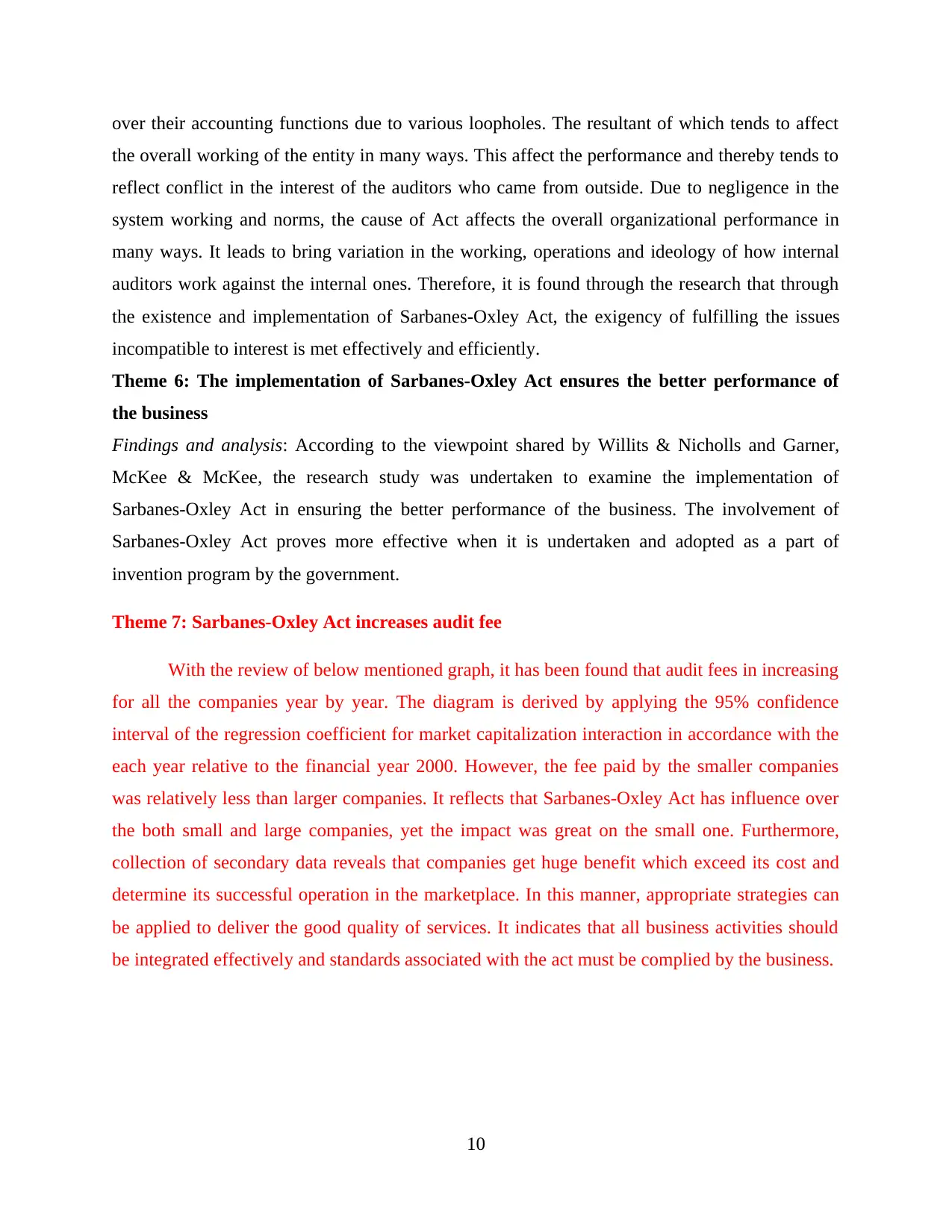
over their accounting functions due to various loopholes. The resultant of which tends to affect
the overall working of the entity in many ways. This affect the performance and thereby tends to
reflect conflict in the interest of the auditors who came from outside. Due to negligence in the
system working and norms, the cause of Act affects the overall organizational performance in
many ways. It leads to bring variation in the working, operations and ideology of how internal
auditors work against the internal ones. Therefore, it is found through the research that through
the existence and implementation of Sarbanes-Oxley Act, the exigency of fulfilling the issues
incompatible to interest is met effectively and efficiently.
Theme 6: The implementation of Sarbanes-Oxley Act ensures the better performance of
the business
Findings and analysis: According to the viewpoint shared by Willits & Nicholls and Garner,
McKee & McKee, the research study was undertaken to examine the implementation of
Sarbanes-Oxley Act in ensuring the better performance of the business. The involvement of
Sarbanes-Oxley Act proves more effective when it is undertaken and adopted as a part of
invention program by the government.
Theme 7: Sarbanes-Oxley Act increases audit fee
With the review of below mentioned graph, it has been found that audit fees in increasing
for all the companies year by year. The diagram is derived by applying the 95% confidence
interval of the regression coefficient for market capitalization interaction in accordance with the
each year relative to the financial year 2000. However, the fee paid by the smaller companies
was relatively less than larger companies. It reflects that Sarbanes-Oxley Act has influence over
the both small and large companies, yet the impact was great on the small one. Furthermore,
collection of secondary data reveals that companies get huge benefit which exceed its cost and
determine its successful operation in the marketplace. In this manner, appropriate strategies can
be applied to deliver the good quality of services. It indicates that all business activities should
be integrated effectively and standards associated with the act must be complied by the business.
10
the overall working of the entity in many ways. This affect the performance and thereby tends to
reflect conflict in the interest of the auditors who came from outside. Due to negligence in the
system working and norms, the cause of Act affects the overall organizational performance in
many ways. It leads to bring variation in the working, operations and ideology of how internal
auditors work against the internal ones. Therefore, it is found through the research that through
the existence and implementation of Sarbanes-Oxley Act, the exigency of fulfilling the issues
incompatible to interest is met effectively and efficiently.
Theme 6: The implementation of Sarbanes-Oxley Act ensures the better performance of
the business
Findings and analysis: According to the viewpoint shared by Willits & Nicholls and Garner,
McKee & McKee, the research study was undertaken to examine the implementation of
Sarbanes-Oxley Act in ensuring the better performance of the business. The involvement of
Sarbanes-Oxley Act proves more effective when it is undertaken and adopted as a part of
invention program by the government.
Theme 7: Sarbanes-Oxley Act increases audit fee
With the review of below mentioned graph, it has been found that audit fees in increasing
for all the companies year by year. The diagram is derived by applying the 95% confidence
interval of the regression coefficient for market capitalization interaction in accordance with the
each year relative to the financial year 2000. However, the fee paid by the smaller companies
was relatively less than larger companies. It reflects that Sarbanes-Oxley Act has influence over
the both small and large companies, yet the impact was great on the small one. Furthermore,
collection of secondary data reveals that companies get huge benefit which exceed its cost and
determine its successful operation in the marketplace. In this manner, appropriate strategies can
be applied to deliver the good quality of services. It indicates that all business activities should
be integrated effectively and standards associated with the act must be complied by the business.
10
Paraphrase This Document
Need a fresh take? Get an instant paraphrase of this document with our AI Paraphraser
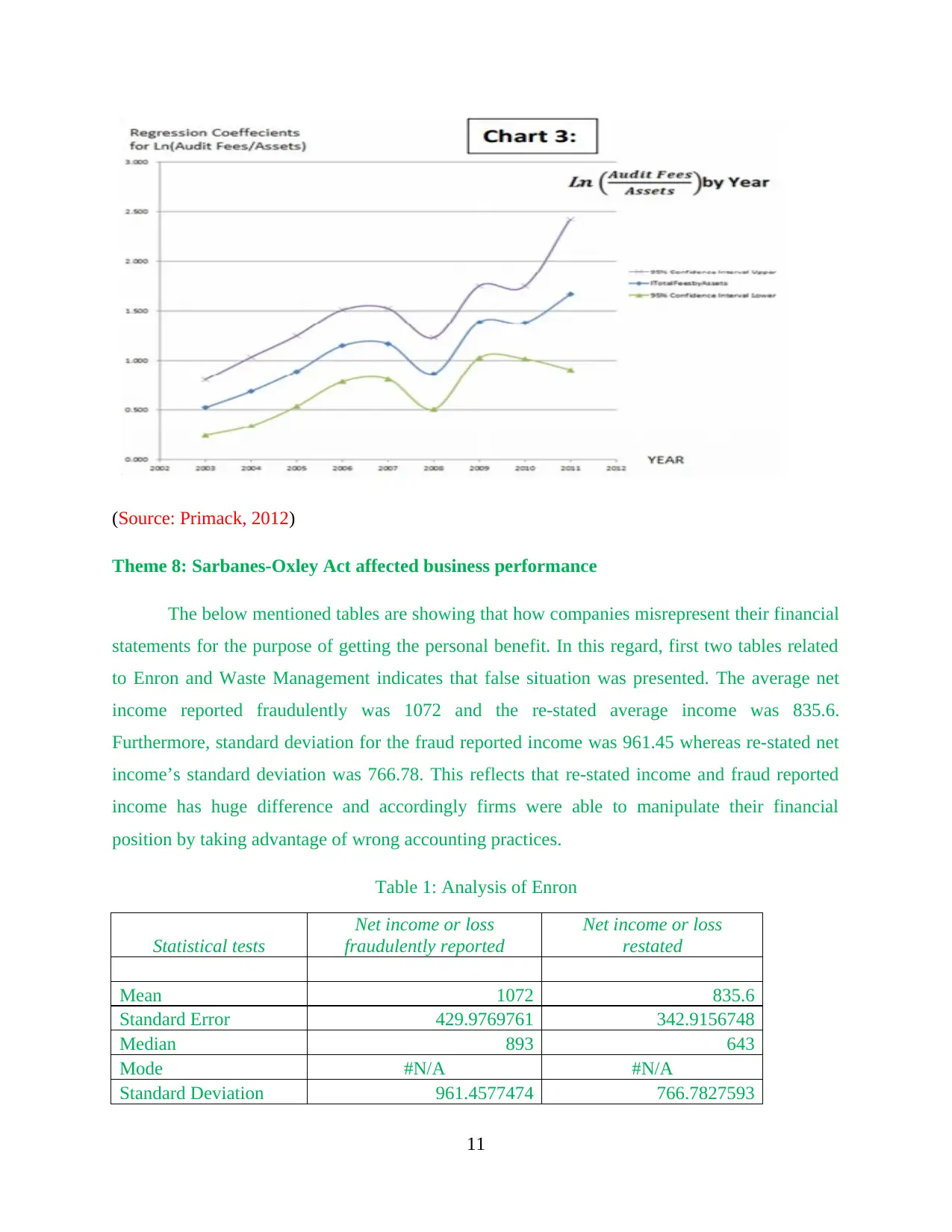
(Source: Primack, 2012)
Theme 8: Sarbanes-Oxley Act affected business performance
The below mentioned tables are showing that how companies misrepresent their financial
statements for the purpose of getting the personal benefit. In this regard, first two tables related
to Enron and Waste Management indicates that false situation was presented. The average net
income reported fraudulently was 1072 and the re-stated average income was 835.6.
Furthermore, standard deviation for the fraud reported income was 961.45 whereas re-stated net
income’s standard deviation was 766.78. This reflects that re-stated income and fraud reported
income has huge difference and accordingly firms were able to manipulate their financial
position by taking advantage of wrong accounting practices.
Table 1: Analysis of Enron
Statistical tests
Net income or loss
fraudulently reported
Net income or loss
restated
Mean 1072 835.6
Standard Error 429.9769761 342.9156748
Median 893 643
Mode #N/A #N/A
Standard Deviation 961.4577474 766.7827593
11
Theme 8: Sarbanes-Oxley Act affected business performance
The below mentioned tables are showing that how companies misrepresent their financial
statements for the purpose of getting the personal benefit. In this regard, first two tables related
to Enron and Waste Management indicates that false situation was presented. The average net
income reported fraudulently was 1072 and the re-stated average income was 835.6.
Furthermore, standard deviation for the fraud reported income was 961.45 whereas re-stated net
income’s standard deviation was 766.78. This reflects that re-stated income and fraud reported
income has huge difference and accordingly firms were able to manipulate their financial
position by taking advantage of wrong accounting practices.
Table 1: Analysis of Enron
Statistical tests
Net income or loss
fraudulently reported
Net income or loss
restated
Mean 1072 835.6
Standard Error 429.9769761 342.9156748
Median 893 643
Mode #N/A #N/A
Standard Deviation 961.4577474 766.7827593
11
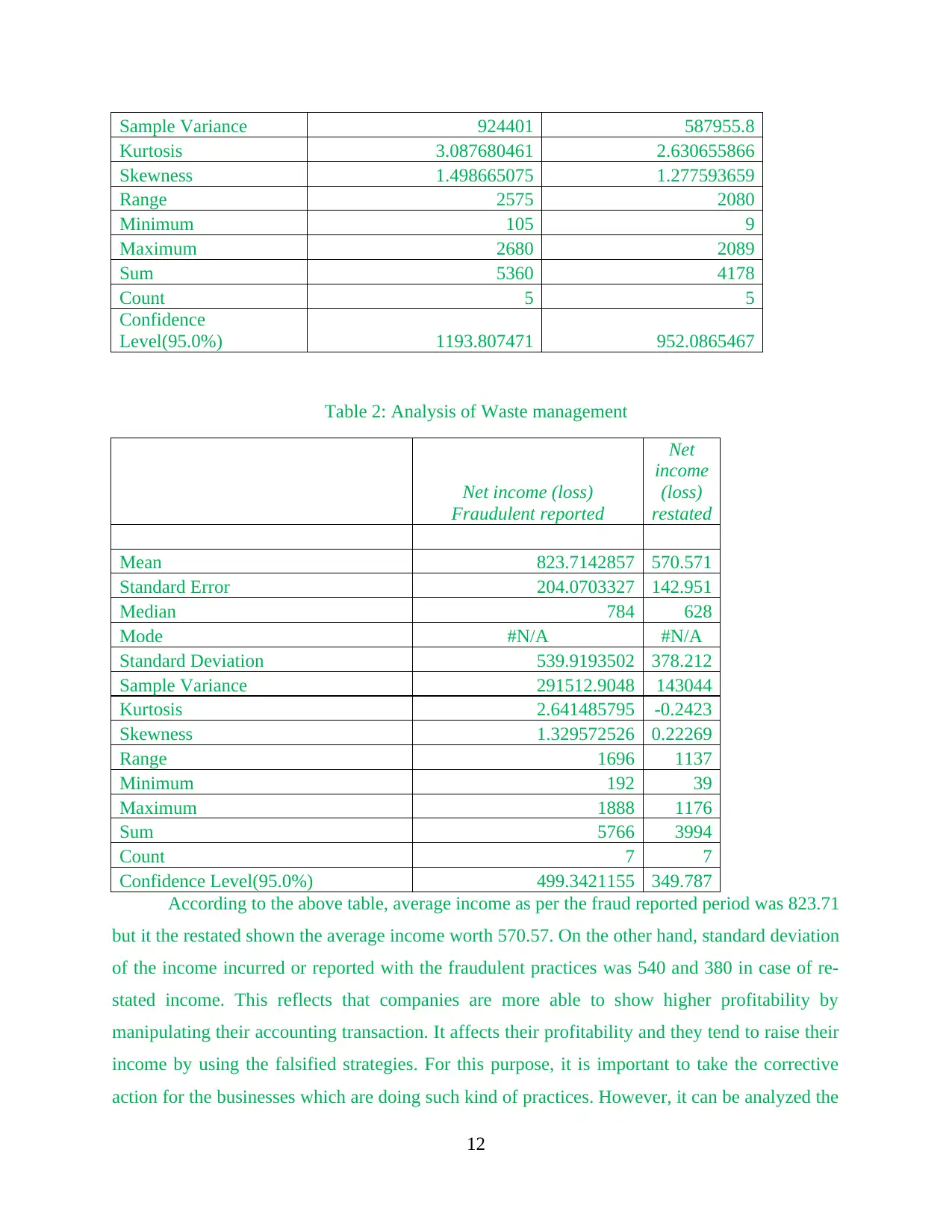
Sample Variance 924401 587955.8
Kurtosis 3.087680461 2.630655866
Skewness 1.498665075 1.277593659
Range 2575 2080
Minimum 105 9
Maximum 2680 2089
Sum 5360 4178
Count 5 5
Confidence
Level(95.0%) 1193.807471 952.0865467
Table 2: Analysis of Waste management
Net income (loss)
Fraudulent reported
Net
income
(loss)
restated
Mean 823.7142857 570.571
Standard Error 204.0703327 142.951
Median 784 628
Mode #N/A #N/A
Standard Deviation 539.9193502 378.212
Sample Variance 291512.9048 143044
Kurtosis 2.641485795 -0.2423
Skewness 1.329572526 0.22269
Range 1696 1137
Minimum 192 39
Maximum 1888 1176
Sum 5766 3994
Count 7 7
Confidence Level(95.0%) 499.3421155 349.787
According to the above table, average income as per the fraud reported period was 823.71
but it the restated shown the average income worth 570.57. On the other hand, standard deviation
of the income incurred or reported with the fraudulent practices was 540 and 380 in case of re-
stated income. This reflects that companies are more able to show higher profitability by
manipulating their accounting transaction. It affects their profitability and they tend to raise their
income by using the falsified strategies. For this purpose, it is important to take the corrective
action for the businesses which are doing such kind of practices. However, it can be analyzed the
12
Kurtosis 3.087680461 2.630655866
Skewness 1.498665075 1.277593659
Range 2575 2080
Minimum 105 9
Maximum 2680 2089
Sum 5360 4178
Count 5 5
Confidence
Level(95.0%) 1193.807471 952.0865467
Table 2: Analysis of Waste management
Net income (loss)
Fraudulent reported
Net
income
(loss)
restated
Mean 823.7142857 570.571
Standard Error 204.0703327 142.951
Median 784 628
Mode #N/A #N/A
Standard Deviation 539.9193502 378.212
Sample Variance 291512.9048 143044
Kurtosis 2.641485795 -0.2423
Skewness 1.329572526 0.22269
Range 1696 1137
Minimum 192 39
Maximum 1888 1176
Sum 5766 3994
Count 7 7
Confidence Level(95.0%) 499.3421155 349.787
According to the above table, average income as per the fraud reported period was 823.71
but it the restated shown the average income worth 570.57. On the other hand, standard deviation
of the income incurred or reported with the fraudulent practices was 540 and 380 in case of re-
stated income. This reflects that companies are more able to show higher profitability by
manipulating their accounting transaction. It affects their profitability and they tend to raise their
income by using the falsified strategies. For this purpose, it is important to take the corrective
action for the businesses which are doing such kind of practices. However, it can be analyzed the
12
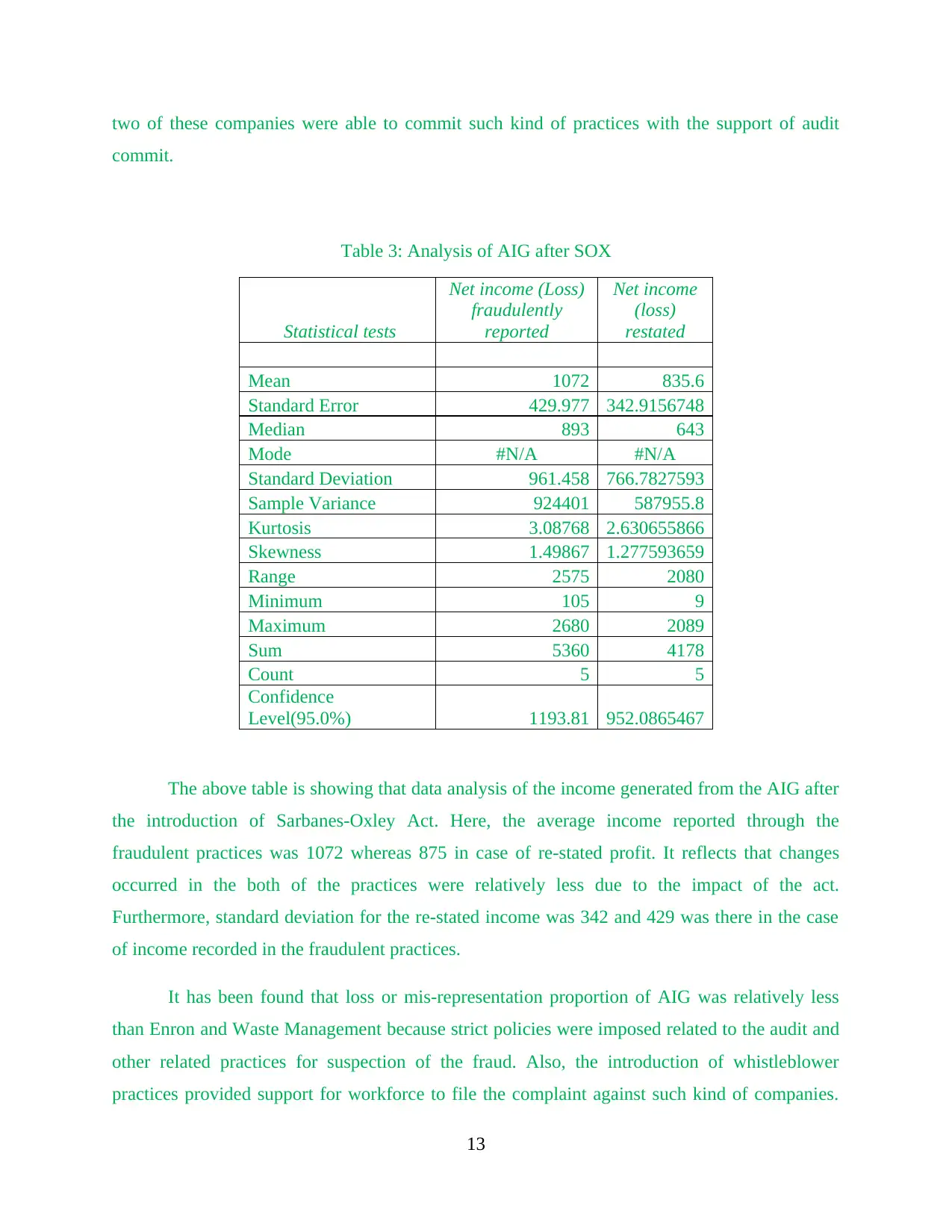
two of these companies were able to commit such kind of practices with the support of audit
commit.
Table 3: Analysis of AIG after SOX
Statistical tests
Net income (Loss)
fraudulently
reported
Net income
(loss)
restated
Mean 1072 835.6
Standard Error 429.977 342.9156748
Median 893 643
Mode #N/A #N/A
Standard Deviation 961.458 766.7827593
Sample Variance 924401 587955.8
Kurtosis 3.08768 2.630655866
Skewness 1.49867 1.277593659
Range 2575 2080
Minimum 105 9
Maximum 2680 2089
Sum 5360 4178
Count 5 5
Confidence
Level(95.0%) 1193.81 952.0865467
The above table is showing that data analysis of the income generated from the AIG after
the introduction of Sarbanes-Oxley Act. Here, the average income reported through the
fraudulent practices was 1072 whereas 875 in case of re-stated profit. It reflects that changes
occurred in the both of the practices were relatively less due to the impact of the act.
Furthermore, standard deviation for the re-stated income was 342 and 429 was there in the case
of income recorded in the fraudulent practices.
It has been found that loss or mis-representation proportion of AIG was relatively less
than Enron and Waste Management because strict policies were imposed related to the audit and
other related practices for suspection of the fraud. Also, the introduction of whistleblower
practices provided support for workforce to file the complaint against such kind of companies.
13
commit.
Table 3: Analysis of AIG after SOX
Statistical tests
Net income (Loss)
fraudulently
reported
Net income
(loss)
restated
Mean 1072 835.6
Standard Error 429.977 342.9156748
Median 893 643
Mode #N/A #N/A
Standard Deviation 961.458 766.7827593
Sample Variance 924401 587955.8
Kurtosis 3.08768 2.630655866
Skewness 1.49867 1.277593659
Range 2575 2080
Minimum 105 9
Maximum 2680 2089
Sum 5360 4178
Count 5 5
Confidence
Level(95.0%) 1193.81 952.0865467
The above table is showing that data analysis of the income generated from the AIG after
the introduction of Sarbanes-Oxley Act. Here, the average income reported through the
fraudulent practices was 1072 whereas 875 in case of re-stated profit. It reflects that changes
occurred in the both of the practices were relatively less due to the impact of the act.
Furthermore, standard deviation for the re-stated income was 342 and 429 was there in the case
of income recorded in the fraudulent practices.
It has been found that loss or mis-representation proportion of AIG was relatively less
than Enron and Waste Management because strict policies were imposed related to the audit and
other related practices for suspection of the fraud. Also, the introduction of whistleblower
practices provided support for workforce to file the complaint against such kind of companies.
13
Secure Best Marks with AI Grader
Need help grading? Try our AI Grader for instant feedback on your assignments.
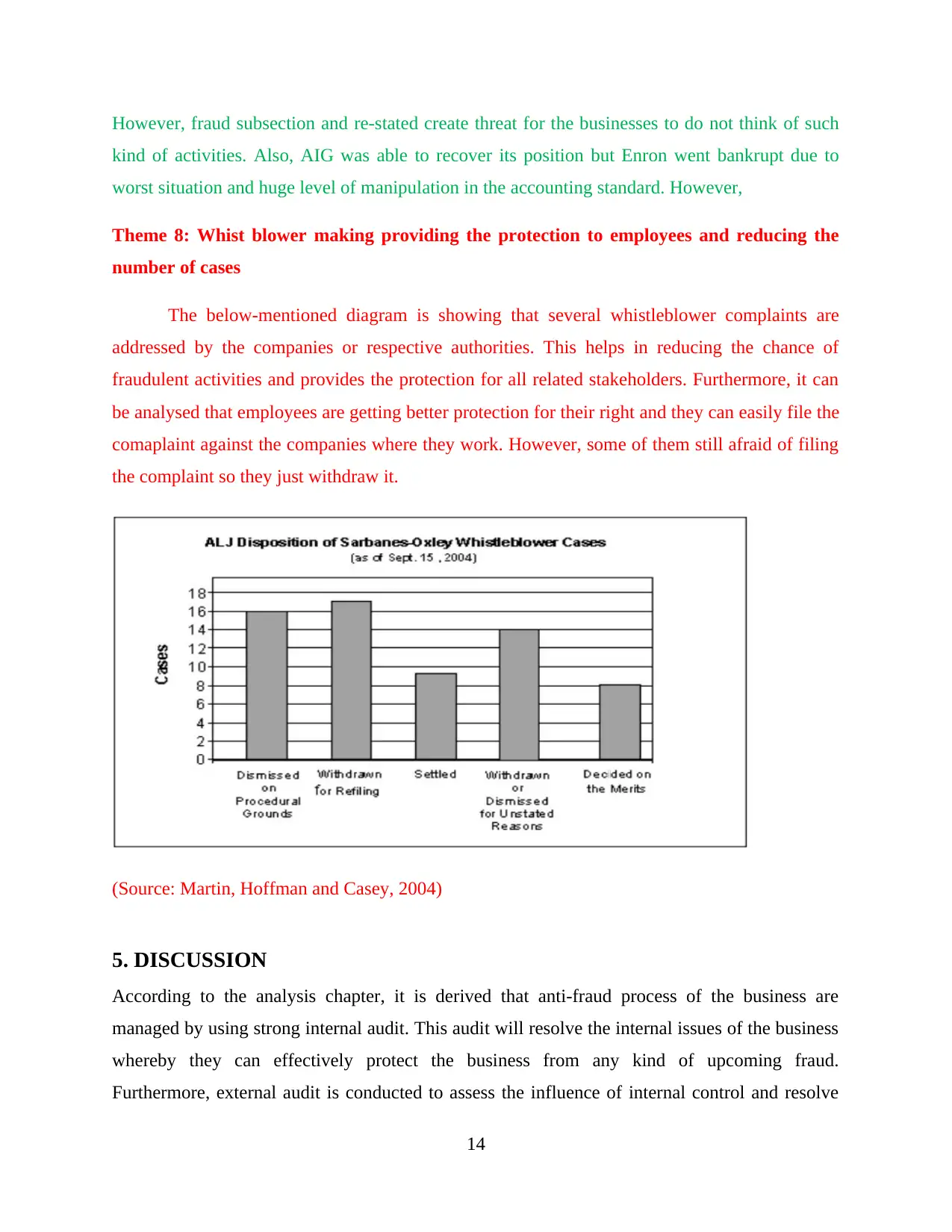
However, fraud subsection and re-stated create threat for the businesses to do not think of such
kind of activities. Also, AIG was able to recover its position but Enron went bankrupt due to
worst situation and huge level of manipulation in the accounting standard. However,
Theme 8: Whist blower making providing the protection to employees and reducing the
number of cases
The below-mentioned diagram is showing that several whistleblower complaints are
addressed by the companies or respective authorities. This helps in reducing the chance of
fraudulent activities and provides the protection for all related stakeholders. Furthermore, it can
be analysed that employees are getting better protection for their right and they can easily file the
comaplaint against the companies where they work. However, some of them still afraid of filing
the complaint so they just withdraw it.
(Source: Martin, Hoffman and Casey, 2004)
5. DISCUSSION
According to the analysis chapter, it is derived that anti-fraud process of the business are
managed by using strong internal audit. This audit will resolve the internal issues of the business
whereby they can effectively protect the business from any kind of upcoming fraud.
Furthermore, external audit is conducted to assess the influence of internal control and resolve
14
kind of activities. Also, AIG was able to recover its position but Enron went bankrupt due to
worst situation and huge level of manipulation in the accounting standard. However,
Theme 8: Whist blower making providing the protection to employees and reducing the
number of cases
The below-mentioned diagram is showing that several whistleblower complaints are
addressed by the companies or respective authorities. This helps in reducing the chance of
fraudulent activities and provides the protection for all related stakeholders. Furthermore, it can
be analysed that employees are getting better protection for their right and they can easily file the
comaplaint against the companies where they work. However, some of them still afraid of filing
the complaint so they just withdraw it.
(Source: Martin, Hoffman and Casey, 2004)
5. DISCUSSION
According to the analysis chapter, it is derived that anti-fraud process of the business are
managed by using strong internal audit. This audit will resolve the internal issues of the business
whereby they can effectively protect the business from any kind of upcoming fraud.
Furthermore, external audit is conducted to assess the influence of internal control and resolve
14
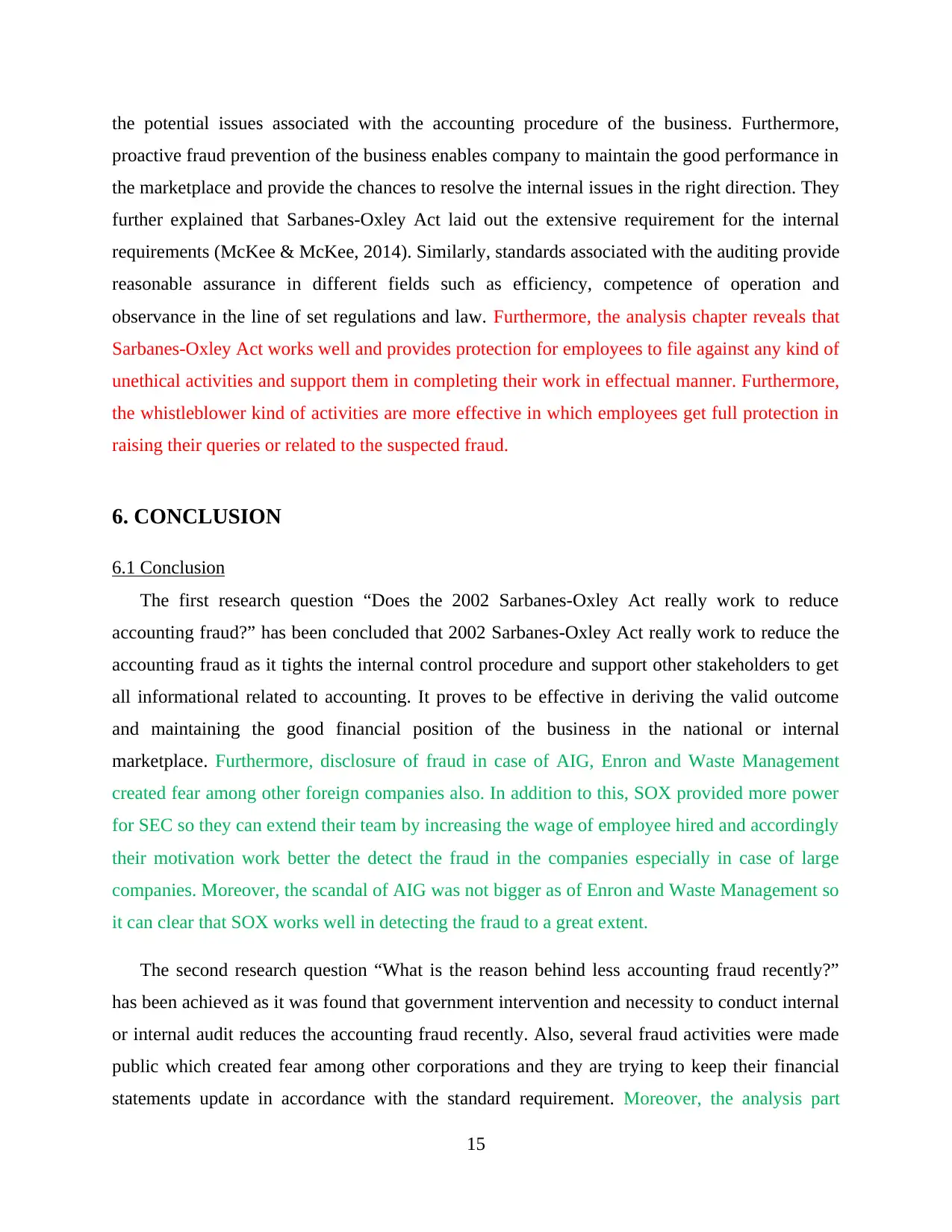
the potential issues associated with the accounting procedure of the business. Furthermore,
proactive fraud prevention of the business enables company to maintain the good performance in
the marketplace and provide the chances to resolve the internal issues in the right direction. They
further explained that Sarbanes-Oxley Act laid out the extensive requirement for the internal
requirements (McKee & McKee, 2014). Similarly, standards associated with the auditing provide
reasonable assurance in different fields such as efficiency, competence of operation and
observance in the line of set regulations and law. Furthermore, the analysis chapter reveals that
Sarbanes-Oxley Act works well and provides protection for employees to file against any kind of
unethical activities and support them in completing their work in effectual manner. Furthermore,
the whistleblower kind of activities are more effective in which employees get full protection in
raising their queries or related to the suspected fraud.
6. CONCLUSION
6.1 Conclusion
The first research question “Does the 2002 Sarbanes-Oxley Act really work to reduce
accounting fraud?” has been concluded that 2002 Sarbanes-Oxley Act really work to reduce the
accounting fraud as it tights the internal control procedure and support other stakeholders to get
all informational related to accounting. It proves to be effective in deriving the valid outcome
and maintaining the good financial position of the business in the national or internal
marketplace. Furthermore, disclosure of fraud in case of AIG, Enron and Waste Management
created fear among other foreign companies also. In addition to this, SOX provided more power
for SEC so they can extend their team by increasing the wage of employee hired and accordingly
their motivation work better the detect the fraud in the companies especially in case of large
companies. Moreover, the scandal of AIG was not bigger as of Enron and Waste Management so
it can clear that SOX works well in detecting the fraud to a great extent.
The second research question “What is the reason behind less accounting fraud recently?”
has been achieved as it was found that government intervention and necessity to conduct internal
or internal audit reduces the accounting fraud recently. Also, several fraud activities were made
public which created fear among other corporations and they are trying to keep their financial
statements update in accordance with the standard requirement. Moreover, the analysis part
15
proactive fraud prevention of the business enables company to maintain the good performance in
the marketplace and provide the chances to resolve the internal issues in the right direction. They
further explained that Sarbanes-Oxley Act laid out the extensive requirement for the internal
requirements (McKee & McKee, 2014). Similarly, standards associated with the auditing provide
reasonable assurance in different fields such as efficiency, competence of operation and
observance in the line of set regulations and law. Furthermore, the analysis chapter reveals that
Sarbanes-Oxley Act works well and provides protection for employees to file against any kind of
unethical activities and support them in completing their work in effectual manner. Furthermore,
the whistleblower kind of activities are more effective in which employees get full protection in
raising their queries or related to the suspected fraud.
6. CONCLUSION
6.1 Conclusion
The first research question “Does the 2002 Sarbanes-Oxley Act really work to reduce
accounting fraud?” has been concluded that 2002 Sarbanes-Oxley Act really work to reduce the
accounting fraud as it tights the internal control procedure and support other stakeholders to get
all informational related to accounting. It proves to be effective in deriving the valid outcome
and maintaining the good financial position of the business in the national or internal
marketplace. Furthermore, disclosure of fraud in case of AIG, Enron and Waste Management
created fear among other foreign companies also. In addition to this, SOX provided more power
for SEC so they can extend their team by increasing the wage of employee hired and accordingly
their motivation work better the detect the fraud in the companies especially in case of large
companies. Moreover, the scandal of AIG was not bigger as of Enron and Waste Management so
it can clear that SOX works well in detecting the fraud to a great extent.
The second research question “What is the reason behind less accounting fraud recently?”
has been achieved as it was found that government intervention and necessity to conduct internal
or internal audit reduces the accounting fraud recently. Also, several fraud activities were made
public which created fear among other corporations and they are trying to keep their financial
statements update in accordance with the standard requirement. Moreover, the analysis part
15
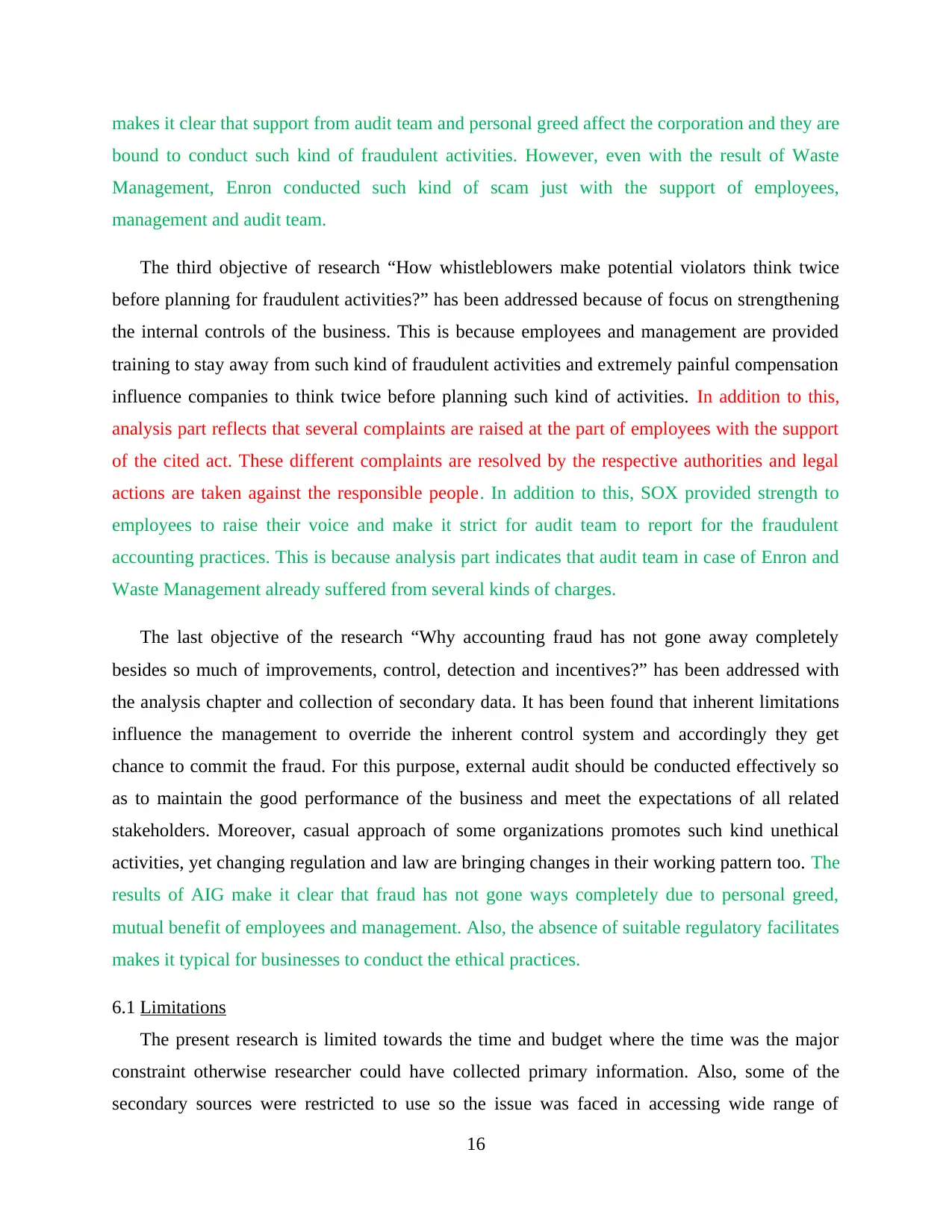
makes it clear that support from audit team and personal greed affect the corporation and they are
bound to conduct such kind of fraudulent activities. However, even with the result of Waste
Management, Enron conducted such kind of scam just with the support of employees,
management and audit team.
The third objective of research “How whistleblowers make potential violators think twice
before planning for fraudulent activities?” has been addressed because of focus on strengthening
the internal controls of the business. This is because employees and management are provided
training to stay away from such kind of fraudulent activities and extremely painful compensation
influence companies to think twice before planning such kind of activities. In addition to this,
analysis part reflects that several complaints are raised at the part of employees with the support
of the cited act. These different complaints are resolved by the respective authorities and legal
actions are taken against the responsible people. In addition to this, SOX provided strength to
employees to raise their voice and make it strict for audit team to report for the fraudulent
accounting practices. This is because analysis part indicates that audit team in case of Enron and
Waste Management already suffered from several kinds of charges.
The last objective of the research “Why accounting fraud has not gone away completely
besides so much of improvements, control, detection and incentives?” has been addressed with
the analysis chapter and collection of secondary data. It has been found that inherent limitations
influence the management to override the inherent control system and accordingly they get
chance to commit the fraud. For this purpose, external audit should be conducted effectively so
as to maintain the good performance of the business and meet the expectations of all related
stakeholders. Moreover, casual approach of some organizations promotes such kind unethical
activities, yet changing regulation and law are bringing changes in their working pattern too. The
results of AIG make it clear that fraud has not gone ways completely due to personal greed,
mutual benefit of employees and management. Also, the absence of suitable regulatory facilitates
makes it typical for businesses to conduct the ethical practices.
6.1 Limitations
The present research is limited towards the time and budget where the time was the major
constraint otherwise researcher could have collected primary information. Also, some of the
secondary sources were restricted to use so the issue was faced in accessing wide range of
16
bound to conduct such kind of fraudulent activities. However, even with the result of Waste
Management, Enron conducted such kind of scam just with the support of employees,
management and audit team.
The third objective of research “How whistleblowers make potential violators think twice
before planning for fraudulent activities?” has been addressed because of focus on strengthening
the internal controls of the business. This is because employees and management are provided
training to stay away from such kind of fraudulent activities and extremely painful compensation
influence companies to think twice before planning such kind of activities. In addition to this,
analysis part reflects that several complaints are raised at the part of employees with the support
of the cited act. These different complaints are resolved by the respective authorities and legal
actions are taken against the responsible people. In addition to this, SOX provided strength to
employees to raise their voice and make it strict for audit team to report for the fraudulent
accounting practices. This is because analysis part indicates that audit team in case of Enron and
Waste Management already suffered from several kinds of charges.
The last objective of the research “Why accounting fraud has not gone away completely
besides so much of improvements, control, detection and incentives?” has been addressed with
the analysis chapter and collection of secondary data. It has been found that inherent limitations
influence the management to override the inherent control system and accordingly they get
chance to commit the fraud. For this purpose, external audit should be conducted effectively so
as to maintain the good performance of the business and meet the expectations of all related
stakeholders. Moreover, casual approach of some organizations promotes such kind unethical
activities, yet changing regulation and law are bringing changes in their working pattern too. The
results of AIG make it clear that fraud has not gone ways completely due to personal greed,
mutual benefit of employees and management. Also, the absence of suitable regulatory facilitates
makes it typical for businesses to conduct the ethical practices.
6.1 Limitations
The present research is limited towards the time and budget where the time was the major
constraint otherwise researcher could have collected primary information. Also, some of the
secondary sources were restricted to use so the issue was faced in accessing wide range of
16
Paraphrase This Document
Need a fresh take? Get an instant paraphrase of this document with our AI Paraphraser
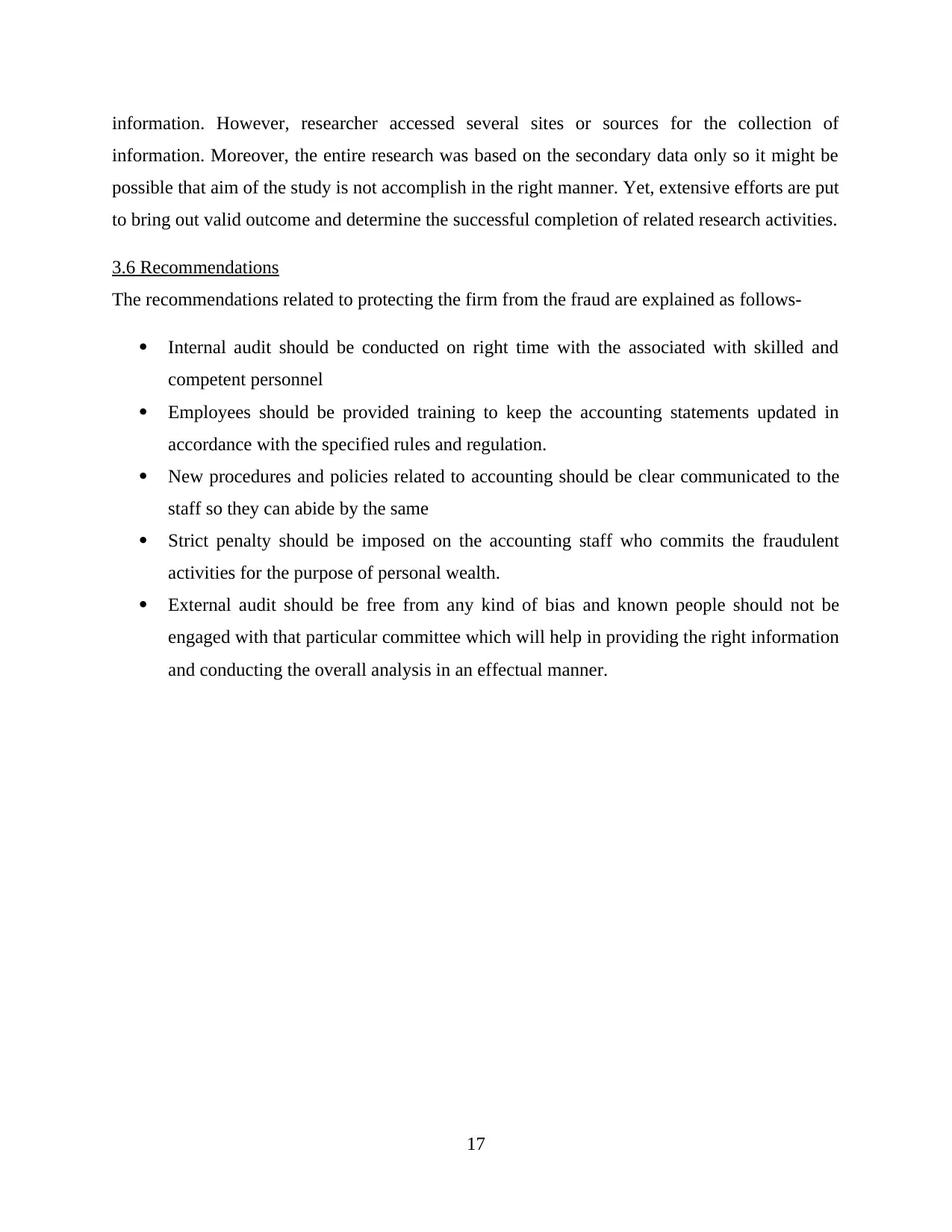
information. However, researcher accessed several sites or sources for the collection of
information. Moreover, the entire research was based on the secondary data only so it might be
possible that aim of the study is not accomplish in the right manner. Yet, extensive efforts are put
to bring out valid outcome and determine the successful completion of related research activities.
3.6 Recommendations
The recommendations related to protecting the firm from the fraud are explained as follows-
Internal audit should be conducted on right time with the associated with skilled and
competent personnel
Employees should be provided training to keep the accounting statements updated in
accordance with the specified rules and regulation.
New procedures and policies related to accounting should be clear communicated to the
staff so they can abide by the same
Strict penalty should be imposed on the accounting staff who commits the fraudulent
activities for the purpose of personal wealth.
External audit should be free from any kind of bias and known people should not be
engaged with that particular committee which will help in providing the right information
and conducting the overall analysis in an effectual manner.
17
information. Moreover, the entire research was based on the secondary data only so it might be
possible that aim of the study is not accomplish in the right manner. Yet, extensive efforts are put
to bring out valid outcome and determine the successful completion of related research activities.
3.6 Recommendations
The recommendations related to protecting the firm from the fraud are explained as follows-
Internal audit should be conducted on right time with the associated with skilled and
competent personnel
Employees should be provided training to keep the accounting statements updated in
accordance with the specified rules and regulation.
New procedures and policies related to accounting should be clear communicated to the
staff so they can abide by the same
Strict penalty should be imposed on the accounting staff who commits the fraudulent
activities for the purpose of personal wealth.
External audit should be free from any kind of bias and known people should not be
engaged with that particular committee which will help in providing the right information
and conducting the overall analysis in an effectual manner.
17
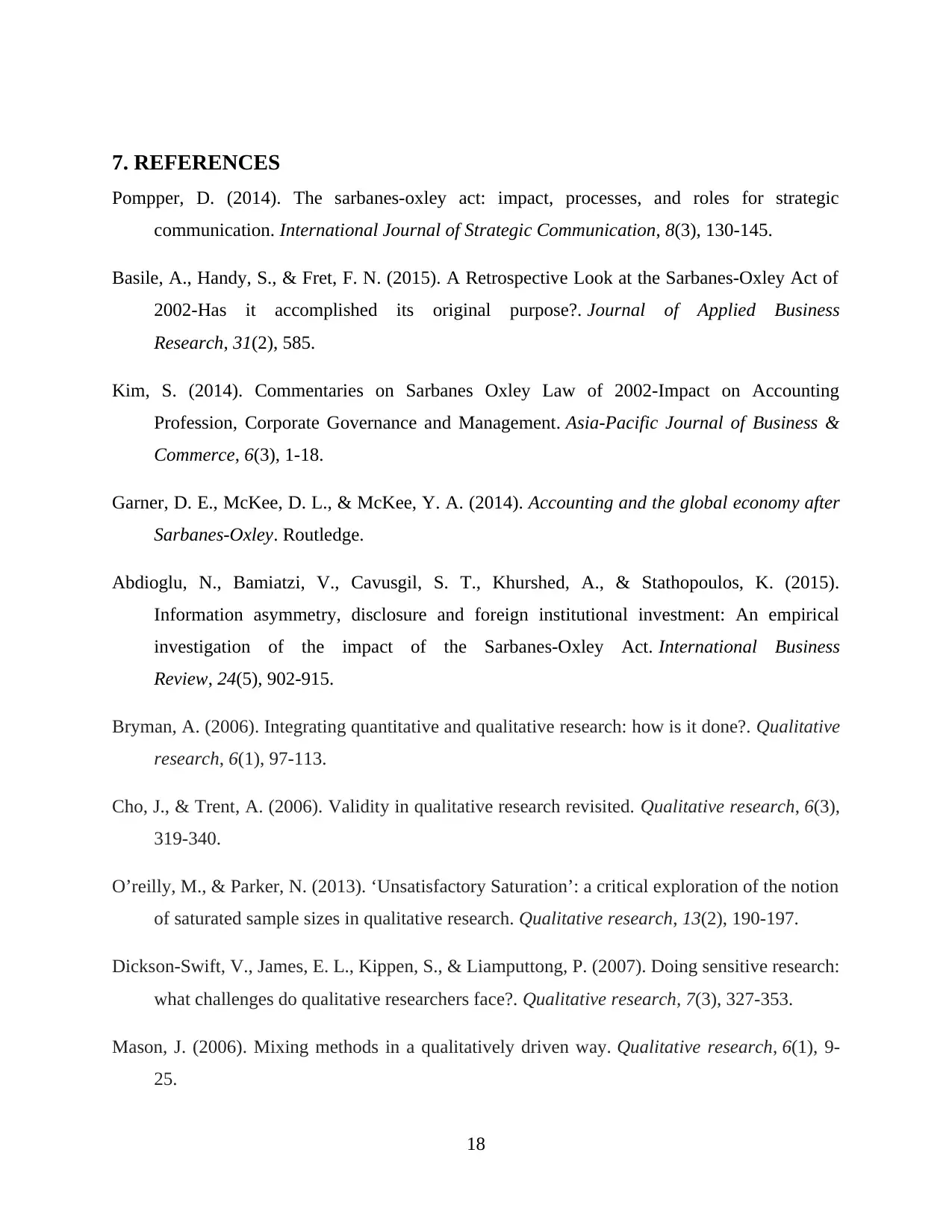
7. REFERENCES
Pompper, D. (2014). The sarbanes-oxley act: impact, processes, and roles for strategic
communication. International Journal of Strategic Communication, 8(3), 130-145.
Basile, A., Handy, S., & Fret, F. N. (2015). A Retrospective Look at the Sarbanes-Oxley Act of
2002-Has it accomplished its original purpose?. Journal of Applied Business
Research, 31(2), 585.
Kim, S. (2014). Commentaries on Sarbanes Oxley Law of 2002-Impact on Accounting
Profession, Corporate Governance and Management. Asia-Pacific Journal of Business &
Commerce, 6(3), 1-18.
Garner, D. E., McKee, D. L., & McKee, Y. A. (2014). Accounting and the global economy after
Sarbanes-Oxley. Routledge.
Abdioglu, N., Bamiatzi, V., Cavusgil, S. T., Khurshed, A., & Stathopoulos, K. (2015).
Information asymmetry, disclosure and foreign institutional investment: An empirical
investigation of the impact of the Sarbanes-Oxley Act. International Business
Review, 24(5), 902-915.
Bryman, A. (2006). Integrating quantitative and qualitative research: how is it done?. Qualitative
research, 6(1), 97-113.
Cho, J., & Trent, A. (2006). Validity in qualitative research revisited. Qualitative research, 6(3),
319-340.
O’reilly, M., & Parker, N. (2013). ‘Unsatisfactory Saturation’: a critical exploration of the notion
of saturated sample sizes in qualitative research. Qualitative research, 13(2), 190-197.
Dickson-Swift, V., James, E. L., Kippen, S., & Liamputtong, P. (2007). Doing sensitive research:
what challenges do qualitative researchers face?. Qualitative research, 7(3), 327-353.
Mason, J. (2006). Mixing methods in a qualitatively driven way. Qualitative research, 6(1), 9-
25.
18
Pompper, D. (2014). The sarbanes-oxley act: impact, processes, and roles for strategic
communication. International Journal of Strategic Communication, 8(3), 130-145.
Basile, A., Handy, S., & Fret, F. N. (2015). A Retrospective Look at the Sarbanes-Oxley Act of
2002-Has it accomplished its original purpose?. Journal of Applied Business
Research, 31(2), 585.
Kim, S. (2014). Commentaries on Sarbanes Oxley Law of 2002-Impact on Accounting
Profession, Corporate Governance and Management. Asia-Pacific Journal of Business &
Commerce, 6(3), 1-18.
Garner, D. E., McKee, D. L., & McKee, Y. A. (2014). Accounting and the global economy after
Sarbanes-Oxley. Routledge.
Abdioglu, N., Bamiatzi, V., Cavusgil, S. T., Khurshed, A., & Stathopoulos, K. (2015).
Information asymmetry, disclosure and foreign institutional investment: An empirical
investigation of the impact of the Sarbanes-Oxley Act. International Business
Review, 24(5), 902-915.
Bryman, A. (2006). Integrating quantitative and qualitative research: how is it done?. Qualitative
research, 6(1), 97-113.
Cho, J., & Trent, A. (2006). Validity in qualitative research revisited. Qualitative research, 6(3),
319-340.
O’reilly, M., & Parker, N. (2013). ‘Unsatisfactory Saturation’: a critical exploration of the notion
of saturated sample sizes in qualitative research. Qualitative research, 13(2), 190-197.
Dickson-Swift, V., James, E. L., Kippen, S., & Liamputtong, P. (2007). Doing sensitive research:
what challenges do qualitative researchers face?. Qualitative research, 7(3), 327-353.
Mason, J. (2006). Mixing methods in a qualitatively driven way. Qualitative research, 6(1), 9-
25.
18
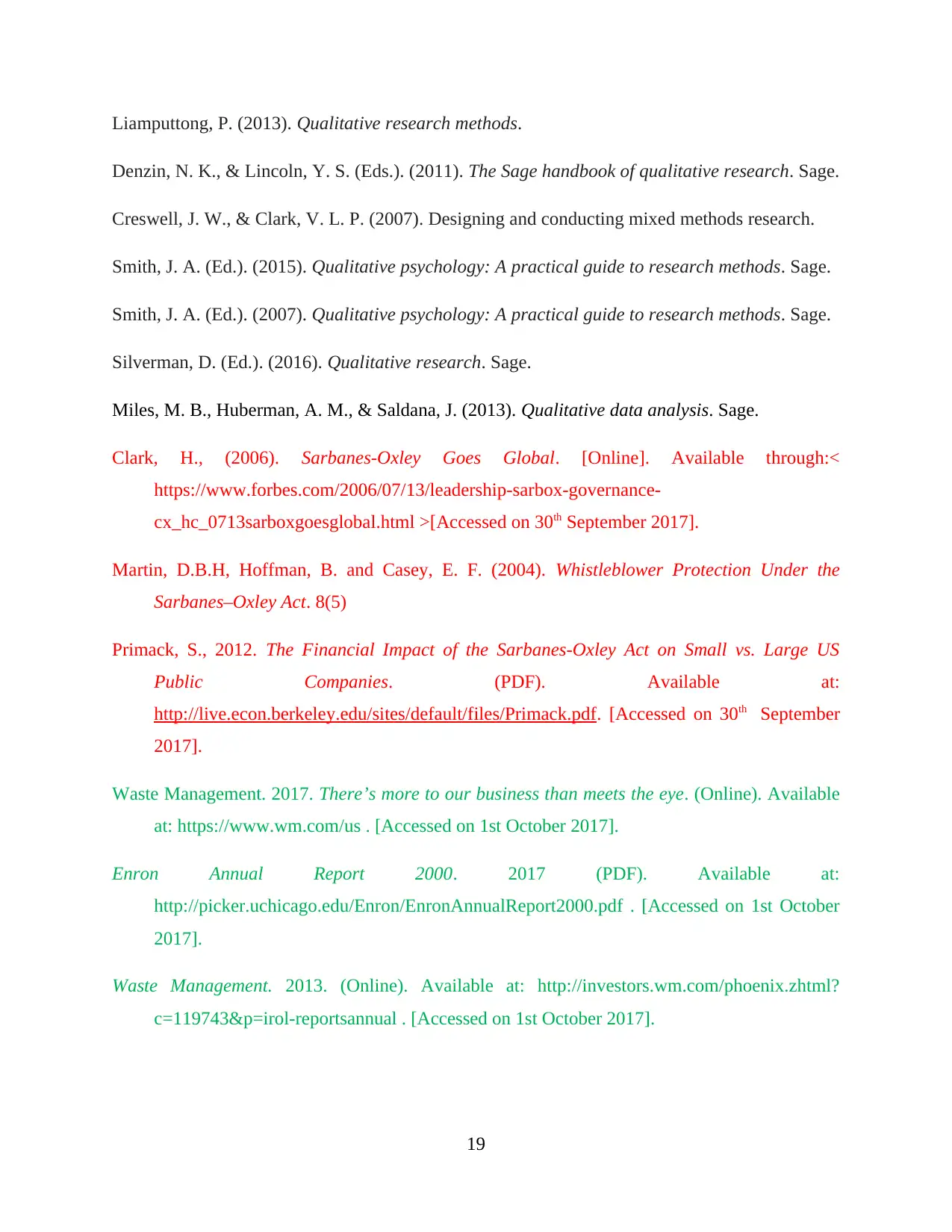
Liamputtong, P. (2013). Qualitative research methods.
Denzin, N. K., & Lincoln, Y. S. (Eds.). (2011). The Sage handbook of qualitative research. Sage.
Creswell, J. W., & Clark, V. L. P. (2007). Designing and conducting mixed methods research.
Smith, J. A. (Ed.). (2015). Qualitative psychology: A practical guide to research methods. Sage.
Smith, J. A. (Ed.). (2007). Qualitative psychology: A practical guide to research methods. Sage.
Silverman, D. (Ed.). (2016). Qualitative research. Sage.
Miles, M. B., Huberman, A. M., & Saldana, J. (2013). Qualitative data analysis. Sage.
Clark, H., (2006). Sarbanes-Oxley Goes Global. [Online]. Available through:<
https://www.forbes.com/2006/07/13/leadership-sarbox-governance-
cx_hc_0713sarboxgoesglobal.html >[Accessed on 30th September 2017].
Martin, D.B.H, Hoffman, B. and Casey, E. F. (2004). Whistleblower Protection Under the
Sarbanes–Oxley Act. 8(5)
Primack, S., 2012. The Financial Impact of the Sarbanes-Oxley Act on Small vs. Large US
Public Companies. (PDF). Available at:
http://live.econ.berkeley.edu/sites/default/files/Primack.pdf. [Accessed on 30th September
2017].
Waste Management. 2017. There’s more to our business than meets the eye. (Online). Available
at: https://www.wm.com/us . [Accessed on 1st October 2017].
Enron Annual Report 2000. 2017 (PDF). Available at:
http://picker.uchicago.edu/Enron/EnronAnnualReport2000.pdf . [Accessed on 1st October
2017].
Waste Management. 2013. (Online). Available at: http://investors.wm.com/phoenix.zhtml?
c=119743&p=irol-reportsannual . [Accessed on 1st October 2017].
19
Denzin, N. K., & Lincoln, Y. S. (Eds.). (2011). The Sage handbook of qualitative research. Sage.
Creswell, J. W., & Clark, V. L. P. (2007). Designing and conducting mixed methods research.
Smith, J. A. (Ed.). (2015). Qualitative psychology: A practical guide to research methods. Sage.
Smith, J. A. (Ed.). (2007). Qualitative psychology: A practical guide to research methods. Sage.
Silverman, D. (Ed.). (2016). Qualitative research. Sage.
Miles, M. B., Huberman, A. M., & Saldana, J. (2013). Qualitative data analysis. Sage.
Clark, H., (2006). Sarbanes-Oxley Goes Global. [Online]. Available through:<
https://www.forbes.com/2006/07/13/leadership-sarbox-governance-
cx_hc_0713sarboxgoesglobal.html >[Accessed on 30th September 2017].
Martin, D.B.H, Hoffman, B. and Casey, E. F. (2004). Whistleblower Protection Under the
Sarbanes–Oxley Act. 8(5)
Primack, S., 2012. The Financial Impact of the Sarbanes-Oxley Act on Small vs. Large US
Public Companies. (PDF). Available at:
http://live.econ.berkeley.edu/sites/default/files/Primack.pdf. [Accessed on 30th September
2017].
Waste Management. 2017. There’s more to our business than meets the eye. (Online). Available
at: https://www.wm.com/us . [Accessed on 1st October 2017].
Enron Annual Report 2000. 2017 (PDF). Available at:
http://picker.uchicago.edu/Enron/EnronAnnualReport2000.pdf . [Accessed on 1st October
2017].
Waste Management. 2013. (Online). Available at: http://investors.wm.com/phoenix.zhtml?
c=119743&p=irol-reportsannual . [Accessed on 1st October 2017].
19
Secure Best Marks with AI Grader
Need help grading? Try our AI Grader for instant feedback on your assignments.
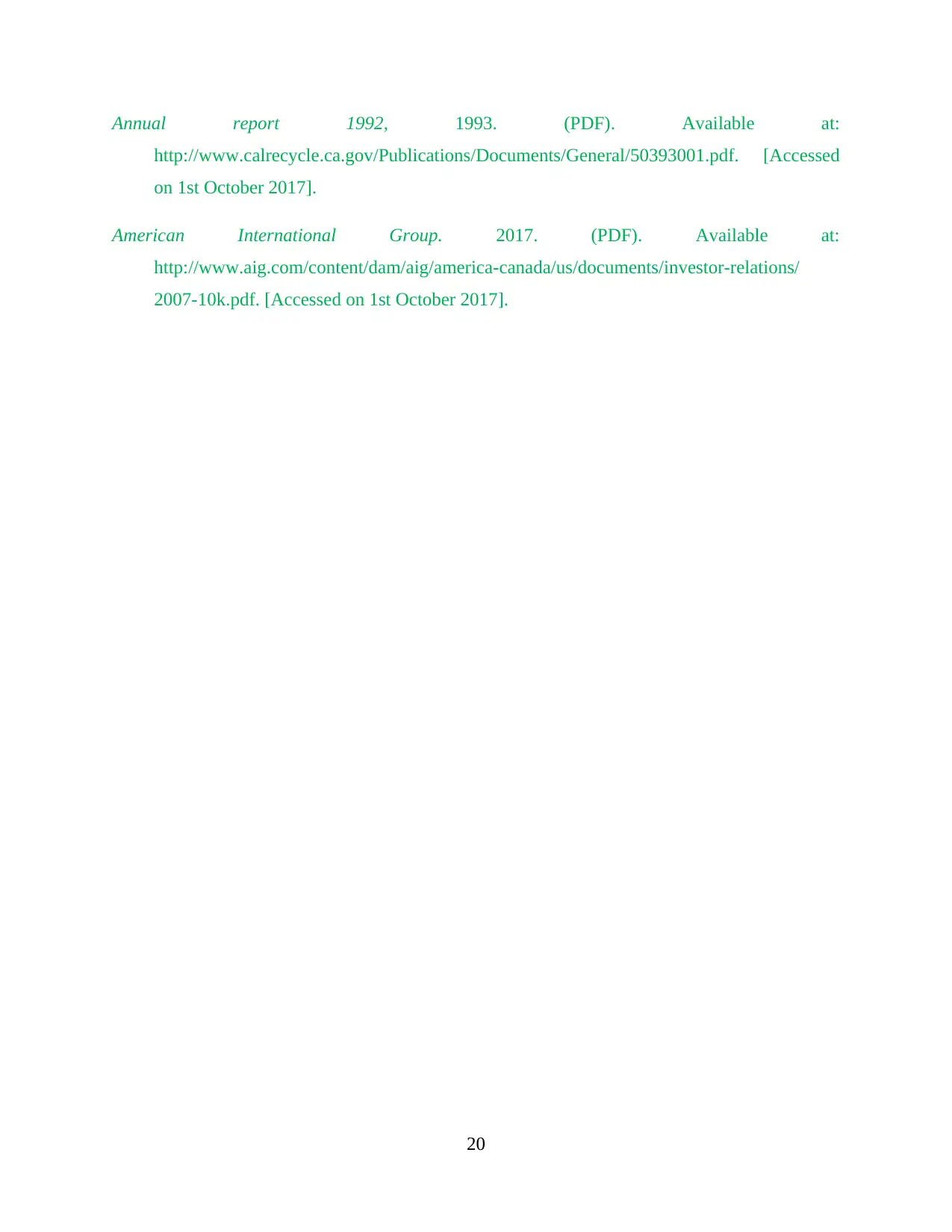
Annual report 1992, 1993. (PDF). Available at:
http://www.calrecycle.ca.gov/Publications/Documents/General/50393001.pdf. [Accessed
on 1st October 2017].
American International Group. 2017. (PDF). Available at:
http://www.aig.com/content/dam/aig/america-canada/us/documents/investor-relations/
2007-10k.pdf. [Accessed on 1st October 2017].
20
http://www.calrecycle.ca.gov/Publications/Documents/General/50393001.pdf. [Accessed
on 1st October 2017].
American International Group. 2017. (PDF). Available at:
http://www.aig.com/content/dam/aig/america-canada/us/documents/investor-relations/
2007-10k.pdf. [Accessed on 1st October 2017].
20
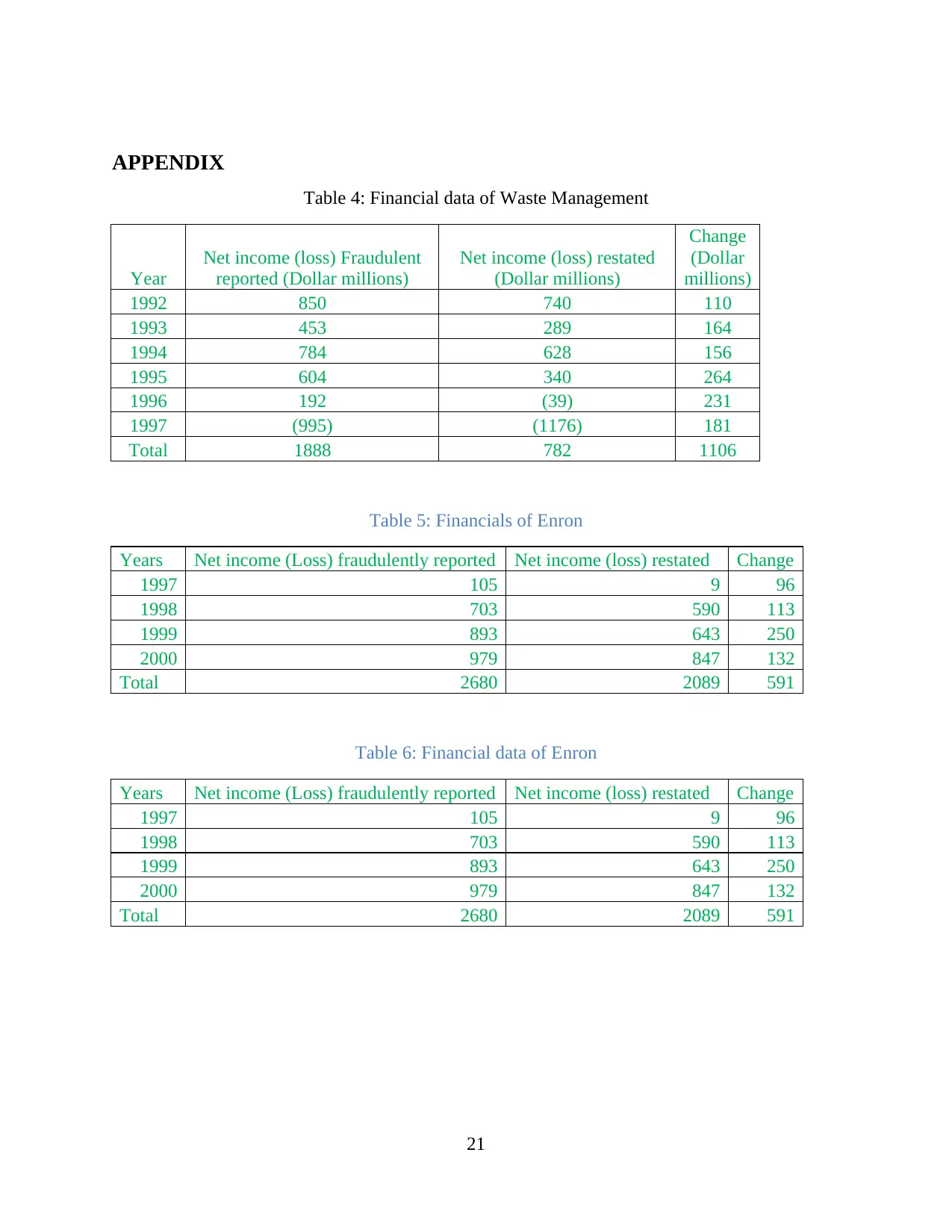
APPENDIX
Table 4: Financial data of Waste Management
Year
Net income (loss) Fraudulent
reported (Dollar millions)
Net income (loss) restated
(Dollar millions)
Change
(Dollar
millions)
1992 850 740 110
1993 453 289 164
1994 784 628 156
1995 604 340 264
1996 192 (39) 231
1997 (995) (1176) 181
Total 1888 782 1106
Table 5: Financials of Enron
Years Net income (Loss) fraudulently reported Net income (loss) restated Change
1997 105 9 96
1998 703 590 113
1999 893 643 250
2000 979 847 132
Total 2680 2089 591
Table 6: Financial data of Enron
Years Net income (Loss) fraudulently reported Net income (loss) restated Change
1997 105 9 96
1998 703 590 113
1999 893 643 250
2000 979 847 132
Total 2680 2089 591
21
Table 4: Financial data of Waste Management
Year
Net income (loss) Fraudulent
reported (Dollar millions)
Net income (loss) restated
(Dollar millions)
Change
(Dollar
millions)
1992 850 740 110
1993 453 289 164
1994 784 628 156
1995 604 340 264
1996 192 (39) 231
1997 (995) (1176) 181
Total 1888 782 1106
Table 5: Financials of Enron
Years Net income (Loss) fraudulently reported Net income (loss) restated Change
1997 105 9 96
1998 703 590 113
1999 893 643 250
2000 979 847 132
Total 2680 2089 591
Table 6: Financial data of Enron
Years Net income (Loss) fraudulently reported Net income (loss) restated Change
1997 105 9 96
1998 703 590 113
1999 893 643 250
2000 979 847 132
Total 2680 2089 591
21
1 out of 24
Related Documents
Your All-in-One AI-Powered Toolkit for Academic Success.
+13062052269
info@desklib.com
Available 24*7 on WhatsApp / Email
![[object Object]](/_next/static/media/star-bottom.7253800d.svg)
Unlock your academic potential
© 2024 | Zucol Services PVT LTD | All rights reserved.





